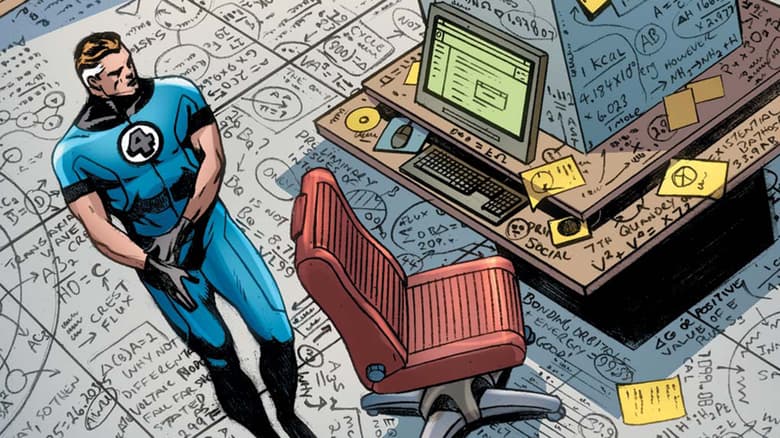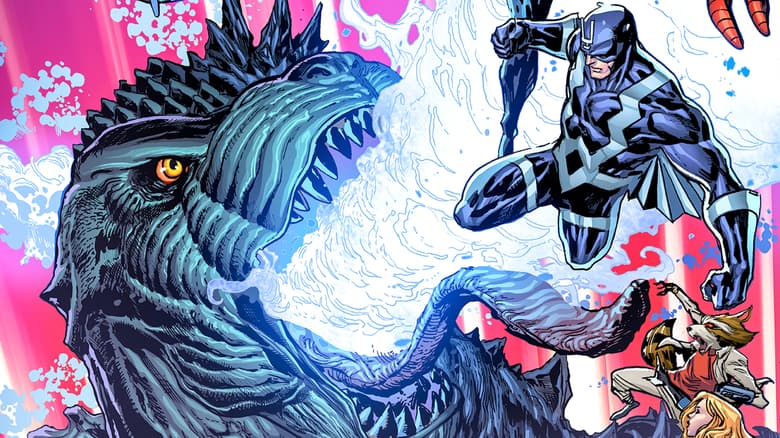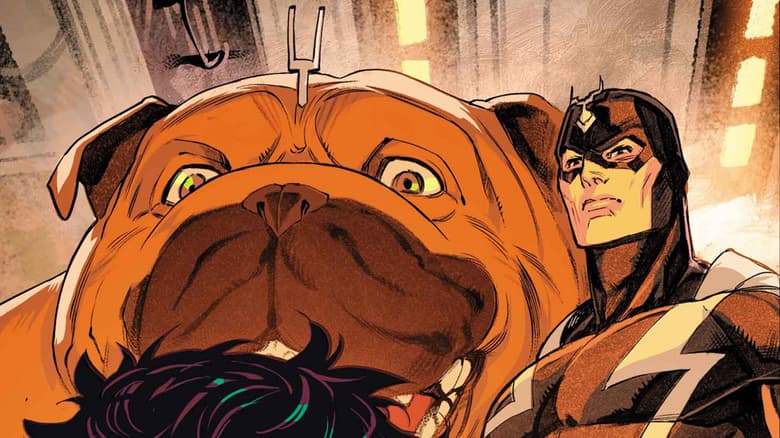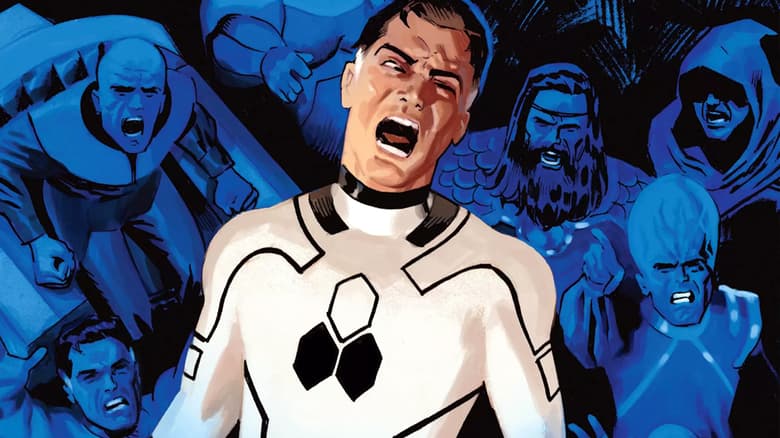In this article: Secret Invasion, Skrulls

By the time they noticed the invasion, it was too late.
In SECRET INVASION (2008), the Avengers—and, indeed, all the Marvel Universe’s heroes—faced a threat unlike any that came before: a Skrull infiltration that had already happened. Without any monologuing or fanfare, this shapeshifting alien species permeated every facet of life, up to and including Super Hero groups like the Avengers and the X-Men. By the time many Marvel heroes realized, they had already lost the battle, but the war for planet Earth was just beginning... and in a world where your neighbor might not be who they claim they are, who can you trust?
Touching down between CIVIL WAR (2006) and DARK REIGN (2008), SECRET INVASION arrived in the heyday of Marvel Comics summer events. SECRET INVASION built off the successes of CIVIL WAR, using both hanging plot threads and lessons learned to launch itself to a new level of Marvel Comics storytelling, all while paving the way for a bold new era: DARK REIGN. What’s more, the event changed the game for Marvel marketing, taking advantage of the new digital landscape for viral marketing, while also evolving time-tested methods to build convention-going staples.
To celebrate SECRET INVASION’s 15th anniversary and the impact it had on Marvel Comics, we spoke to the people that brought it to life.
This is the story of SECRET INVASION.
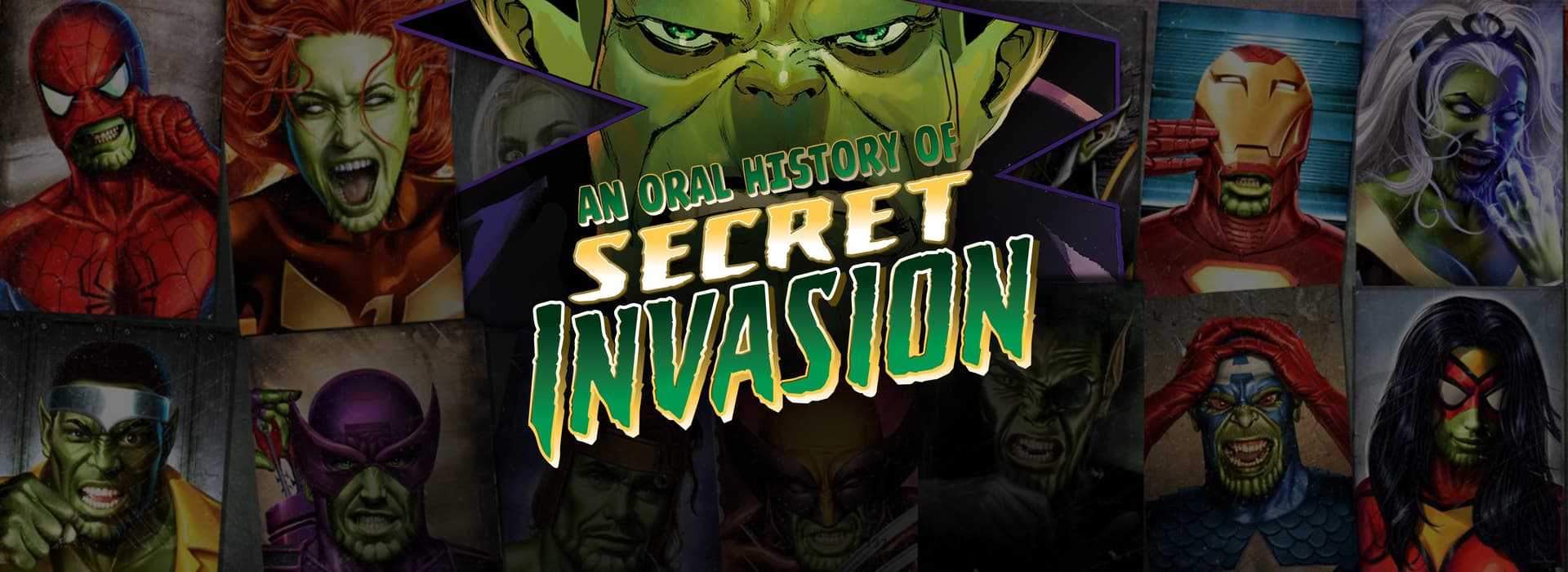
A Retreat to Remember
Tom Brevoort (editor): Brian Bendis had come on to write NEW AVENGERS, which was a shakeup and a reimagining of the Avengers, eliminating certain characters that had been in the book and bringing other newer characters in, hence the name "New Avengers."
Brian Michael Bendis (writer): I got the job to basically run the AVENGERS franchise, which is a little different than just, "Oh, I'm writing SPIDER-MAN!" When you're writing a book like THE AVENGERS, it's a corner of the Marvel Universe that touches six, seven, eight, nine, 10, 20 elements that have to be attended to. We had this big—now we look back on it as a legendary Marvel retreat, where… the whole point of the retreat was to just go around the room, look at every single book, and go, "Why do we publish it?" Not because we own it, but what is this book? What is it supposed to be? Is it that, and if not, why not? What can we do to make it that thing?
We got to AVENGERS, and me and [writer] Mark [Milllar] were not pitching for the gig. We were just there to talk. We were just there to give our nerd expertise. Mark went on a rant about how when he was growing up as a wee lad in Scotland, he would always buy the group books because you got more for your money. Like for $0.10, you got the whole Justice League, not just Batman, and Avengers should be that. The conversation turned us towards, "Well, THE AVENGERS is supposed to be the biggest and the best and the brightest." It's supposed to represent [that], and sometimes it has, and sometimes it's been some stranger lineup.
At the moment, it was in a bit of a strange lineup with Jack of Hearts and She-Hulk, who—at the time—wasn't a TV star. So we were looking at who the lineup was and just as fans going, "Well, why doesn't the lineup reflect who Marvel is right now at the best, and wouldn't that be, yes, Captain America, Thor, and Iron Man, but Spider-Man and Wolverine and the ones that have now become the centerpiece of the Marvel Universe, even though they may not be associated with the Avengers franchise?"
By the end of the conversation, I was shocked to find myself as the writer of THE AVENGERS, which I was not pitching for. I had my gigs; I was thrilled I had them. Team books were still a frustration for me—like, I hadn't nailed them. By the end of the night, it was either me or Mark were going to take over THE AVENGERS based on this conversation. Mark was already on the ULTIMATES, and so he already had an AVENGERS book, so it kind of landed on me. So I went back to my hotel room and I made this big long list of what I should and shouldn't do as part of THE AVENGERS.
Tom Brevoort: As Brian started to work on the series, at some early point, he got that notion in his head of the idea for what would become SECRET INVASION: the idea that characters had been replaced in the past by Skrulls. So he began writing issues with that in mind.
Brian Michael Bendis: One of my big ideas was an Invasion of the Body Snatchers-style story with the Skrulls, like I was doing with Purple Man in Jessica Jones [ALIAS]. The Purple Man was always used for laughs for most of his appearances prior to Jessica Jones, but when I had seen him, even in those books, I go, "That sounds terrifying! Like this is a guy who can do all that? Let's play it for horror." And then I applied the same philosophy to how I saw the Skrulls, like the shapeshifting people sliding into our society and all that that entails for the Marvel Universe. That sounds like a giant thriller epic that we could really make a meal out of.
Tom Brevoort: He didn't tell anybody about this. He just started to do it. It was all pretty much below the waterline, anyway. There wasn't anything overtly in any of these books that would have made you go, "That character is acting weird! They must be a Skrull!" But he knew who he'd intended to be Skrulls, at least some of them, while writing all of these issues. So he wrote them accordingly; he wrote them planting that, planting them in certain positions or saying certain things or what have you, that he could then go back to later and go, "Ah, see? Here's a flashback to that with a different context that helps to show you what's actually going on."
Brian Michael Bendis: It was in my original NEW AVENGERS pitch, and it was a "We're going to do these storylines and all of them will lead up to"—the arrogance of this—"issue #50 of NEW AVENGERS will reveal who was a Skrull the entire time," and that would entail us in editorial knowing right now who the Skrulls are, never letting anyone know outside the circle because gossip and websites and nonsense that easily leaks, so let's keep it to two or three people. We'll know who everybody is, and we'll go for it.
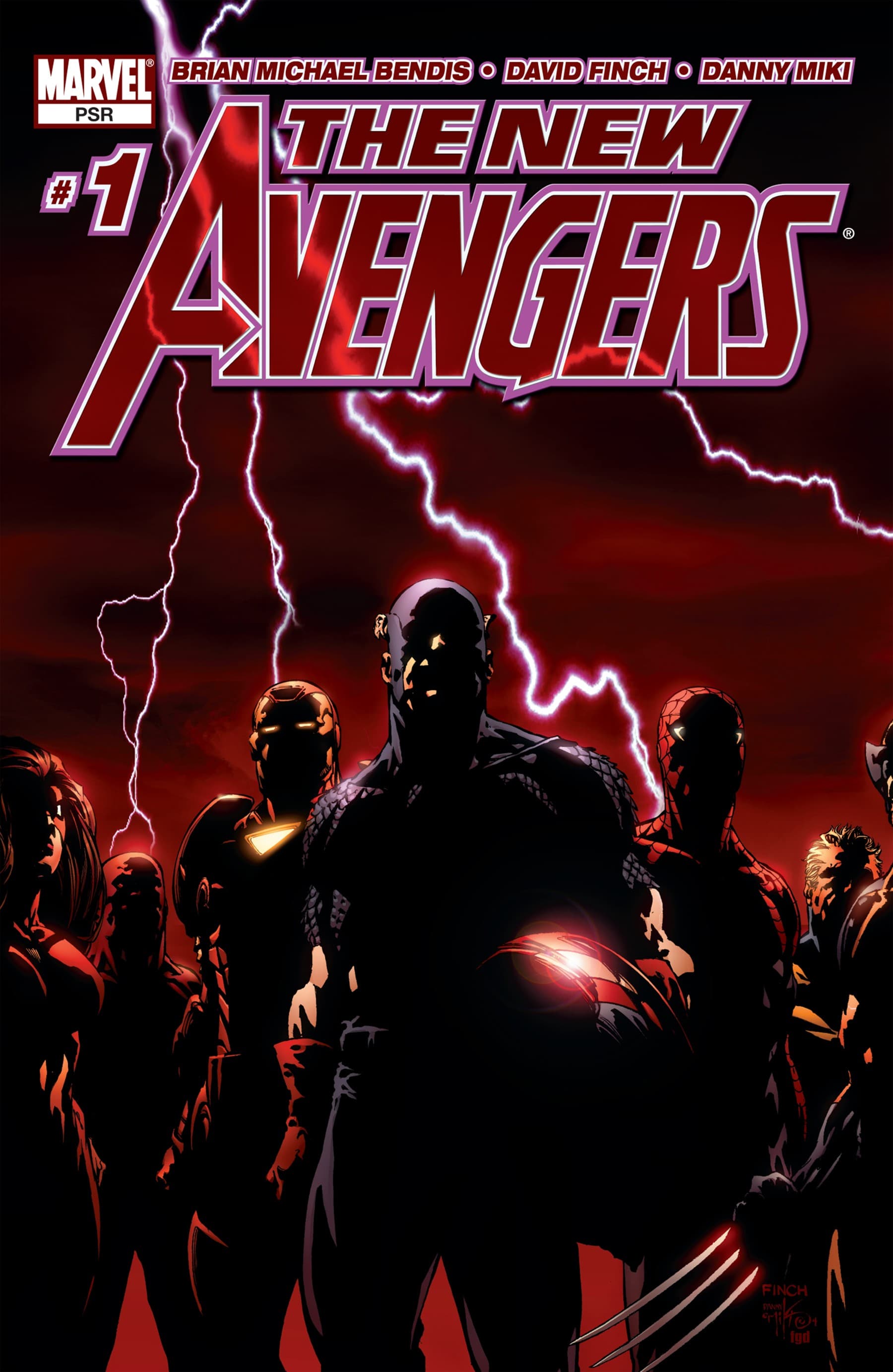
Dan Buckley (President, Marvel Comics): When we started talking about these event books, HOUSE OF M was the first one and the whole editorial group really wasn't back in groove with that yet. You have to remember, you come out of the '90s, as you come back into the aughts… there was a lot of crossover events. Comics of the '90s—like GALACTIC STORM, INFINITY GAUNTLET—where [events] became a dirty word in the comic book industry.
Brian Michael Bendis: Everyone loved the idea in theory, but at the time, we weren't doing events. We weren't doing summer events. Those had gone away during the heydays of the '90s. While all of this was percolating in NEW AVENGERS and NEW AVENGERS was launching, so was ASTONISHING X-MEN with Joss Whedon. Then quickly, I got a call that said, "Hey, Joss has to take the summer off to film something. Can you do an X-MEN/AVENGERS crossover?" And I'm like, "Oh, that sounds fun. Yes, I love those. Let me think about that." And that became HOUSE OF M.
Dan Buckley: The concept of events was not really part of the publishing plan at that point, so I was kind of pushing for it, because I wanted things that we could market around and build excitement around that could lift not one book, but several books or the whole line.
Brian Michael Bendis: If you see the first cover of HOUSE OF M, it literally says "Avengers vs. X-Men," and then we got rid of that when it was obvious it was more of a Marvel Universe storyline and less of a centered on the book's storyline. We had accidentally invented a summer event with HOUSE OF M. By the time it was out the door, by issue three, it was an event, but that's not how it was marketed or sent out. But it was a huge hit financially. It was the biggest numbers they had seen in a while. I remember very clearly we were back in event business, like that was going to happen. Then CIVIL WAR came out of that philosophy.
Tom Brevoort: The last cycle of retreats, we had come up with and executed CIVIL WAR and WORLD WAR HULK. So we were coming up to this latest retreat, and at a certain point, Brian called me and said, "I need to give you an update on all this stuff, because we're going into this retreat and it's going to all come up." And this is where he started to explain to me his ideas for the SECRET INVASION story.
He said, in very strong words, "I really want this to be just an AVENGERS story. We have two AVENGERS books now, NEW AVENGERS and MIGHTY AVENGERS, and I really want this to just stay in a thing. I know there's going to be the impulse after CIVIL WAR and WORLD WAR HULK to make this a bigger, line-wide thing, but I really want to do it there." And I said, "Okay, Brian, I'll support you on that. That'll be our position."
Brian Michael Bendis: Dan Buckley turned to me and said, "Hey, that Skrull thing you're cooking is our summer [event] next summer." I go, "Oh, it is?" I thought, "No, it's just in the book. We're just not going to promote it. We're just going to shock you, right?" And he went, "Uh huh. You know, it's our summer. It's huge. It's big. It's got all the elements we need. And we were sitting there thinking, 'We got to build something for the summer' and you already built it, so that's what we're going to do."
Tom Brevoort: Our publisher, Dan Buckley, said, "That's not just a story in AVENGERS. That's next year's big event," and he turned to me and I immediately went, "Yeah, absolutely. You're right." I sold Brian out completely.
Dan Buckley: I didn't really know the full extent in which Brian was digging into this from the get go, because he had been playing with the Skrull underground invasion type of thing longer than, I think, even editorial really knew. Tom Brevoort, I think, knew with SECRET WAR—the Gabriele Dell'Otto book or the painted book—is where he started really laying the seeds for it. We kind of knew, but we didn't know when we were going to hit it. It was just one of these things that was sitting underneath the hood.
Tom Brevoort: It was awful of me, but I literally read the room in that moment, and I went, "He's gonna win. Brian's not going to win. I can sit here and fight and argue for the next 2 hours, or I could just cut to the part where it's going to end up anyway."
Which is, honestly, not the way I typically like to do things with creators. I still tell this jokingly, but I do feel bad about having done it, even though everything ultimately worked out fine, because I'd had that conversation with Brian, and he was really hoping to do it a different way.
Brian Michael Bendis: I stopped arguing about it because [Buckley] was basically saying, "We're going to promote it and give it everything you would ever want...to have as an author." It was developed just as a storyline, but then all of the machinery around how we were publishing shifted so much by the time I was ready to pull the trigger on Elektra Skrull that the mandate had come down that it was going to take another shape.
Dan Buckley: I always felt that it should be an event book, because like I said, he was just playing it card down in the AVENGERS book... When he presented it, it just felt like a summer event book to me… I heard it and it jumped out of my head completely because it was an easy—as I said in the beginning—it's like you don't know who the Skrull is, you don't know which ones are not. It's easy for anybody to play with.
It was a much easier event to tie everyone into than HOUSE OF M, which was boxed into the X-Men world, and WORLD WAR HULK was told where people could do tie-ins—they did it—but it wasn't organically easy. For SECRET INVASION, it was just like, yeah, you could do that. So that's probably why I jumped on it. Also, just the visuals jumped into my head immediately, like Skrull heads on Super Hero costumes and stuff like that. It just felt fun.
Tom Brevoort: This is what it ended up being—much bigger and much more successful, which is not a bad thing, but it wasn't where he was coming from. So at that point, [Bendis] had to start thinking about how to take that story that was going to be in these two AVENGERS books and blow it up larger into a self-contained series that would also have a ton of tie-ins, including all of the issues of NEW AVENGERS and MIGHTY AVENGERS for eight months, as well as opportunities for other titles to tie in, whether indirect inline tie-ins or in dedicated limited series and things.
Brian Michael Bendis: I also thought that, because of HOUSE OF M and CIVIL WAR, a lot had succeeded, and a lot of lessons had been learned, and all of them—marketing wise, editorial, publishing—all of those summer event lessons got applied directly to SECRET INVASION. Even though CIVIL WAR was the bigger hit, lessons were learned.
I think it's the strongest summer event editorially. I'm not saying that from my writing standpoint. I'm saying I saw marketing kicking ass; they had great ideas every day. Editorial kicking ass, keeping it tight, keeping the secrets secret.
Without any fanfare, Elektra is a Skrull—spoilers [from] 20 years ago—and she falls to the floor, turned into a Skrull. Because I have such Daredevil DNA in my writing, I think it's the last thing you expect to see, right? And the Skrull hits the floor and I remember going, "Oh, I hope people are into this, because if they're not, we still got a long way to go." And they were way into it. Even those who were like, "What?!" like three weeks later, after they gave it some thought, were way into it.
That was the tagline: Who can you trust? And again, it was equally simple and elegant and filled your nerd head full of imagination, and those who worry about us doing the wrong thing all the time had plenty to worry about: "Oh my God! Spider-Man's been a Skrull since AMAZING FANTASY #15!" Thinking about all the terrible things we could do to mess up the back issues and all of the continuity.
Of course, we had planned out that stuff, never to have to worry about it, and made sure that we weren't rewriting anybody's stories. I couldn't imagine some writer from the '80s finding out, "Oh, that story? That character was a Skrull the whole time, which I never meant"—like that kind of thing. That could be easily done poorly or mean to other writers who had no interest in any of this. It was about us finding moments and times and then letting our collaborators know when it was time that the star of your book is a Skrull, congratulations.
Dan Buckley: When we thought it was the right time to do the story, we were all excited because it was a fun high concept. You could do a lot of event-y things and tie into books pretty easily, like, "Are you a Skrull or not a Skrull?" and things like that, where it's not complicated to get into the story. We were very excited about when he finally said he was ready to do it.
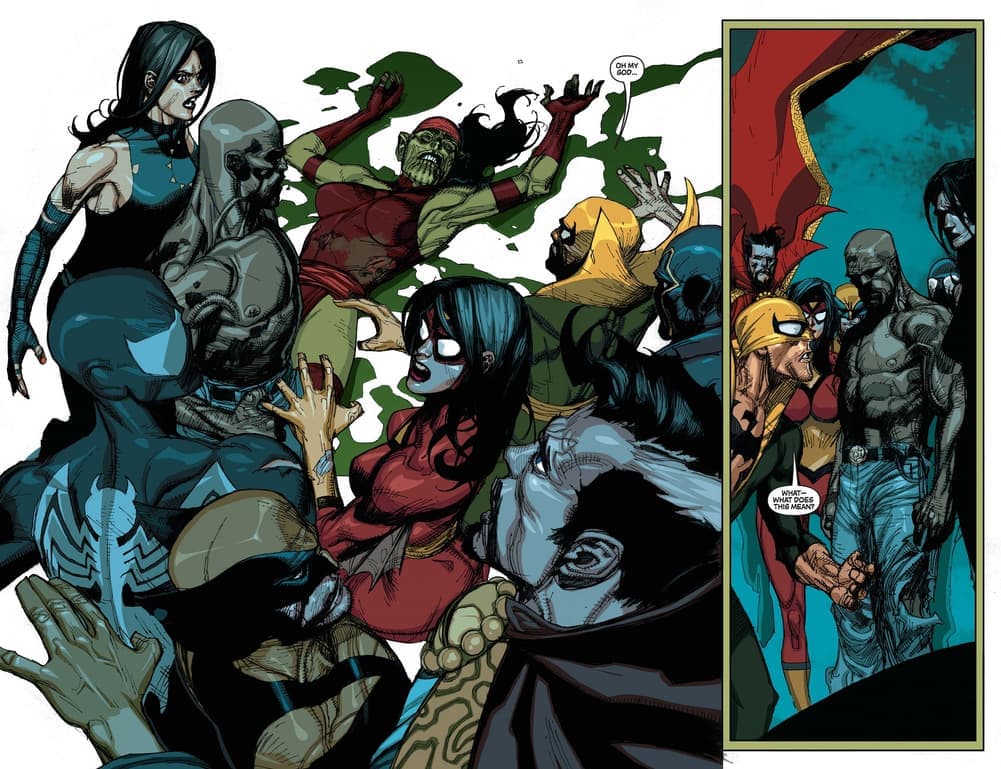
Brian Michael Bendis: The best summer events offered us writers a shared universe opportunity to do something we would not have thought of on our own, but because it's in a shared universe and it's happening, "Oh, I can have a lot of fun with this. I can go nuts."
I had quite a few moments within CIVIL WAR and its delay in the middle where I had opportunities to dive in and do more story. One of these issues involved Luke Cage not backing down, not surrendering to what was going on in CIVIL WAR. That issue was drawn by Leinil [Francis] Yu. I've always been a fan of Leinil forever and ever and ever, met in person, and they're like, "Leinil's available." I'm like, "Great." And then it was already an issue I was dying to do. I had such passionate feelings about it.
Leinil Francis Yu (artist): I was doing NEW AVENGERS with Brian Bendis and I just remembered being offered the project. I had no idea how big and memorable it would be. It certainly is one of the highlights of my career. Brian is one of the best and nicest writers I’ve ever worked with and is also the most challenging. He is known for fantastic dialogue, which involves a lot of panels. A lot of brain power is required to plan the panels, balancing between aesthetics and story functionality.
Brian Michael Bendis: [Leinil] came in like a thunderball and just nailed [our CIVIL WAR issue]. It's an amazing issue. Every panel is gorgeous and it's Luke and Jessica and Daredevil. It's all the stuff I was really connected to. So it ended up being one of our best issues we ever did. Everyone went, "Whoa!" at both of us together. And then, when it was like, "Who should draw SECRET INVASION?" I'm like, "I mean, literally, he just auditioned for it!"
It was a perfect example—I tell all my students every gig is also an audition for some job you don't even know exists, so roll up your sleeves and kick ass because you never know what other job is available because of what you're doing, and that's a perfect example of it. He had no idea that there was this enormous job coming his way. We did some AVENGERS stuff together and then off we were to the races.
Leinil Francis Yu: It was a tremendous undertaking and Marvel always gave me enough time. During this period, I believe I was laying out on smaller paper, planning and changing character placement multiple times to complete the pages. A lot of careful planning was involved.
Brian Michael Bendis: At one point, it was just called SKRULLS! with an exclamation mark with a 1950s logo, like an Aliens!, like a real B-movie alien invasion kind of thing, because we were like, "Let's not be cheeky about it. Just say what it is."
And the idea of SECRET INVASION, of what it is—it's a secret invasion—and then that was the temp name: well, it's a secret invasion, we'll just call it that for now... And then it stuck, and now it's a logo, and now it's on Disney+. It's the strangest feeling in the world when you see something that—like, it was the best title, but it kind of just became the title. It wasn't selected. It just became the title, and that's very weird.
Dan Buckley: I also loved the name. SECRET INVASION is a great name.
Brian Michael Bendis: I was the only one who wanted to call it SKRULLS!, by the way.
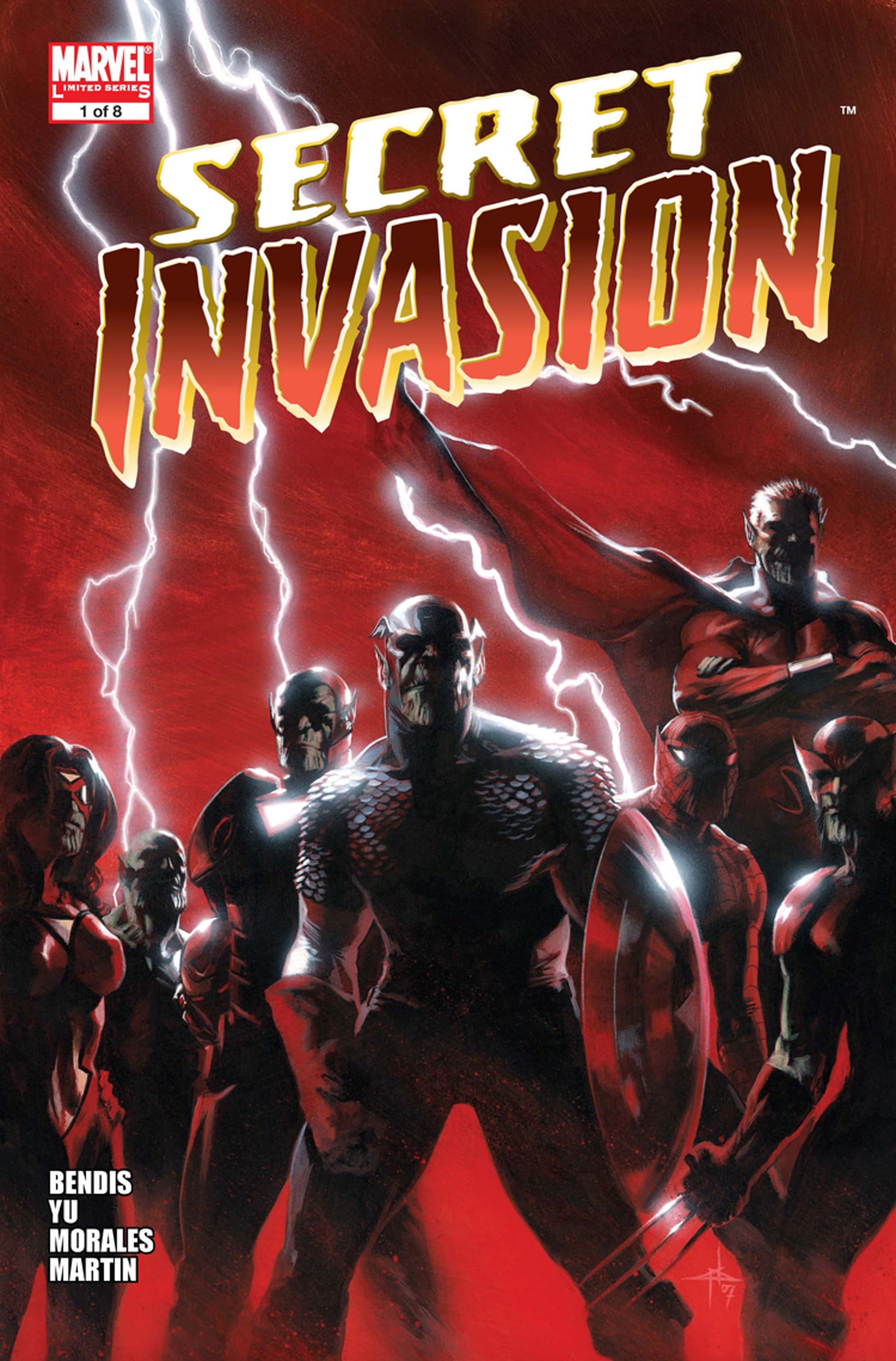
The Skrull Vote
Brian Michael Bendis (writer): The headline was that, once Elektra Skrull hits the floor, that's the inciting incident. On a technical writing level—the story has started or a new story has started: what is this? And to then embrace it in SECRET INVASION #1 as the start of a story that's already started was something I had never tried before and something that was a challenge and I got really excited about. Can we do that? Can we invite people into something that it's already started?
Both HOUSE OF M and CIVIL WAR, the inciting incident happened inside the summer event—like it's in the first issue: this is what happens; this is where we're going. Even if there were preludes and lead ups and everything we do, the actual what happened in CIVIL WAR happened in CIVIL WAR, whereas this one was different. This one is percolating in AVENGERS and the first Skrulls appear in AVENGERS and then here it comes and that it will all be solved in SECRET INVASION.
Douglas Wolk (author, All of the Marvels: A Journey to the Ends of the Biggest Story Ever Told): SECRET INVASION was where Brian Michael Bendis really cracked what makes for an effective multiple-threaded event comic: not just high stakes and significant consequences, but a long, deliberate buildup to the big show. The comics Bendis was writing had been laying the groundwork for the invasion since the beginning of NEW AVENGERS, and actively building toward it for more than a year before SECRET INVASION #1 itself.
Brian Michael Bendis: I had to find a way to reestablish the story where the actual story of SECRET INVASION plays on its own, but I also have this giant, "flipping over all the cards" storyline I want to do that would take over other books.
We were working editorially at a very high level. It was like we had all met each other and worked together and had some wins under our belt and felt we could take our relationship to the next level, which is more elaborate editorial stuff, which is: which Skrulls are Skrulls and where do we land them and when and how do we set the chessboard up perfectly?
Dan Buckley (President, Marvel Comics): We went through a bunch of stuff to make sure Elektra could be a Skrull. Would anything she did as a Skrull—because she would have to Skrull for a while—but the people you had to think about who were Skrulls, you had to work backwards and say, "Is there something that they did that would make it a contradiction?" So you just ended up having arguments in the room a lot.
Brian Michael Bendis: The big one, really, was, "Who is a Skrull? What do we get out of it? Which characters?" and it has to make sense. “Why would the Skrull pick this person? What were they doing? What was their mission?" Some of it was just recon, just keep an eye on things: "Let us know when this sh*t hits the fan." My instinct was—and something that was handed to me—that CIVIL WAR was when the Skrulls went, "Oh yeah, they've never been weaker than they are right now. Let's go!" So they kind of did it to themselves.
Tom Brevoort (editor): We went in and Brian set the table of, by the end of the first issue, a Skrull ship crash lands in the Savage Land and the door opens and all of these Marvel heroes from the '70s walk out. So the notion is, "Oh, this hasn't been those characters potentially since—whatever—1976," let's say. The notion of that really was that some of that—a lot of that—might be true.
I was definitely the one in the room most often going, "You can't do that. That's not going to work with that character. You can't say Iron Man hasn't been Iron Man since 1976. We have a lot of readers, maybe 98% of them, who started reading IRON MAN later than 1976, and if you try to tell them that every single story they've read about Iron Man has been a Skrull, they're going to kill us. They're not going to accept this."
Brian Michael Bendis: We had to really keep an eye on the Jenga tower of reveals. [Editor-in-Chief] Joe Quesada was very focused on this. No matter how well you're crafting it, a Skrull reveal is basically the same punchline to the same joke, right? Think about how many times you can tell this joke and still get a laugh and still get a reaction.
That was an outstanding note that I took with me very carefully: one too many and all of it's not good. We knew one reveal too little and you mess it up; one reveal too much, you mess it up. If everyone's a Skrull, it doesn't work. If only three people are Skrulls, it doesn't work. So that was a big one. Really, it's about architecting, about really making sure all the pieces are where they belong and all the truth is being told.
And then on top of it, it's fun and interesting and coherent—clarity when there's like 80 lead characters and some of them aren't really who they are. Keeping it clear and fun to read is a huge challenge.
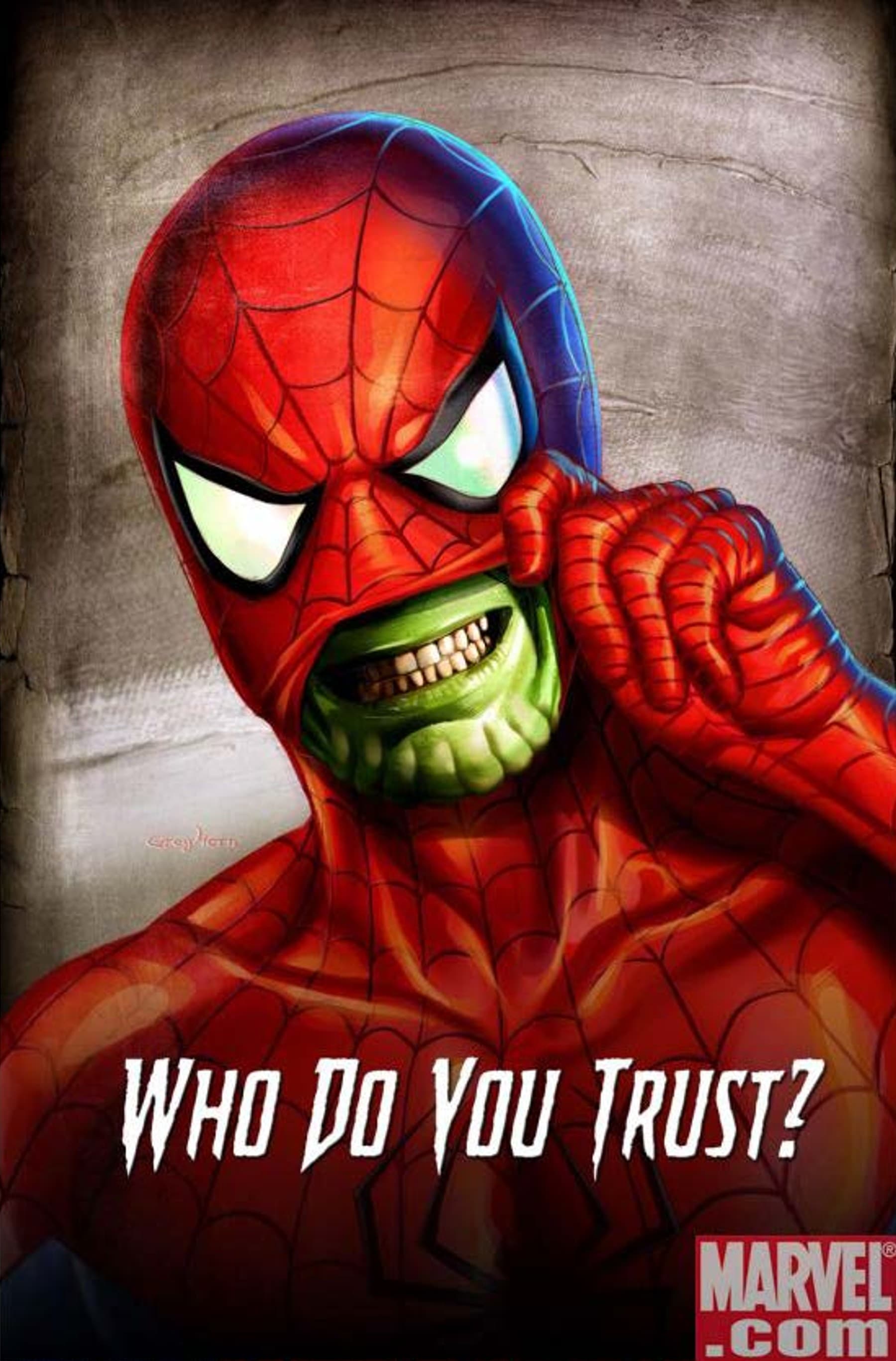
David Gabriel (VP, Print and Digital Publishing): Internally, we had some of the greatest creative discussions over who would or would not be discovered to be have been replaced. It was an exciting collaborative time for us all.
Tom Brevoort: People looked at this as an opportunity to either bring back characters who were dead that they liked or to fix problems. One of the longest-running fights was over Hank Pym, because they wanted to go, "Oh, let's bring Hank Pym back, and then we can say that the Hank Pym that struck Janet, that was a Skrull, and he'll be a good guy again." And it's like, "Yeah, but that story happened in 1981, and there's no good way to say that every Hank Pym appearance since 1981 was a Skrull. You can do it. It's just not good." More people will be unhappy with it, and it shifts the bedrock under your feet too much to me. You could do it if it was shorter.
Dan Buckley: It was like, "No, no, no, that is contradicting!" and then the writer and the editor would argue back and forth. There may have been some voting on the final tally, because I often would go to a vote in those retreats, sometimes, when people just wouldn't to get off a topic. One of the more legendary ones is they almost brought Gwen Stacy back at one point and I did not want to bring Gwen Stacy back.
Tom Brevoort: Saying Spider-Woman has been a Skrull since the beginning of NEW AVENGERS, that's not a problem. Brian knew she was a Skrull when he was writing those stories. It's baked in, so that's okay.
But you can't go back and say Gwen Stacy is alive now because that was a Skrull that got thrown off that bridge, because as much as you want Gwen Stacy back, that's a problem. There are too many stories in which that's the fundamentals. The thing that's appealing about it, of course, is it's transgressive and therefore exciting and therefore dangerous and daring. Yeah, people are going to get upset, but they'll be excited. That's always the argument.
Dan Buckley: When it came to me, and I had the final vote, "bring Gwen back" was up by one. My single vote created a tie. I then said were tied, and in order to change something you need to win the vote... so I essentially gave myself two votes. Some people were not very pleased with me because I gave myself two votes at the end.
Tom Brevoort: To me, it was always a baby/bathwater thing. You can do this, and you can do some of this, and we took the opportunity to get Mockingbird back in this, for example. She had died in—I'm going to say—1993, 1994. That's still a long way back, but not that long, having been dead; there were not a lot of stories that you were invalidating by bringing her back. It was literally just a, "Here's a character that we thought was dead and now they're alive again." That's fine. But going back and saying that the Beast hasn't been the Beast since 1976? I'm sorry, that's a bridge too far.
Brian Michael Bendis: What was really cool was looking for characters who hadn't been around. That's where Jessica Jones' story came from; they kind of tap in and tap out, like they're on the stage and then they're off the stage. And when they're off the stage, the people who are on the stage are too busy living their lives and you don't notice, "Oh, I haven't seen my friend in a year," right? And then, "Oh, they were kidnaped by aliens! Damn!" So I thought Bobbi was perfect for that. She fit all those pieces and was an awesome West Coast Avenger.
Tom Brevoort: There'd be long conversations and discussions and arguments in the room, and there was even at least one that I know that we went around the room and voted on. I sat there and I went, "I don't care what this vote is. We're going to leave this room and we're going to go back to our offices and we're going to work. I'm not going to fight any of these fights in the room. There's too many people to fight!”
So I don't remember which one it was, but there was at least one where there was a vote in the room and they went, "Great! It's a Skrull!' and by Tuesday, it was, "Nope! No, they're not," because I went and I said, "I'm not going to win this in the room, but I'll be better positioned to win it after the fact."
Dan Buckley: Because of [Tom's] stature as an editor, other editors are going to fall in line a little bit and not just fall in line and do the crossover, but also listen to the notes saying, "I need to borrow this character for here. How do I get it there?" You know, talking about which characters become Skrulls, which ones did not, what happened to them. But getting the big throughline beats done. If you can get that done, then you can go back to the retreat—I think we discussed this in probably three different creative retreats, and by the third one, you're pretty much like, "Are you lined up?"
But you need the writer to lay out the beats with the executive senior editor running the project, and then you just have a lot of people just e-mailing each other back and forth, but if you have the throughlines, you can make it work. If the writer doesn't want to get ahead a little bit, at least with the story beats, it's really hard to do the events. If the writer does get ahead on those story beats—and Brian had a lot of it in his head already, because he had been thinking about it by himself for so long.... That's kind of what helped. Brian had all these things going on in his noggin for a while.
Brian Michael Bendis: A shared universe is filled with little factoids or moments of characters that some fans remember, and other fans don't and you can refer to them without bogging down all of it. You can refer to it, and then a younger reader can Google, "Is that true? Did that happen? Oh man, it did happen!" And then they feel part of it and then may go back and read those issues, and we've all experienced this.
So then, with my message board in my social media, I was feeling that a lot throughout my AVENGERS run. By even just reintroducing Luke Cage, it was to an audience that really hadn't met him before. So some people actually thought I had invented Luke Cage; I had to correct them, like, "No, no, no, this is a classic, true Marvel hero."
I got empowered by it. I'm like, "Oh, who else can I introduce you to? What else can I tell you about? Oh, yeah!" And then I remembered, when I was a kid, that's what [writer] Frank Miller did for me. He would introduce me to stuff that I would then have to go chase down where this all came from and how exciting that was and how much I loved going to the comic store with my list of back issues that I must have to finish my the Hand saga. So we did that here, just these little bits of trivia and knowledge that we have about the characters.
It also lets people know if I can be a little—you know, all of us Marvel writers, everyone hits you with, "You don't know as much as I know!" The reader is always like, "I know more than you and you're the writer of the book!" It's always nice, without getting into a fight with anyone online, just to go, "No, I know my stuff. We use it when it's appropriate," and that's what's behind it.
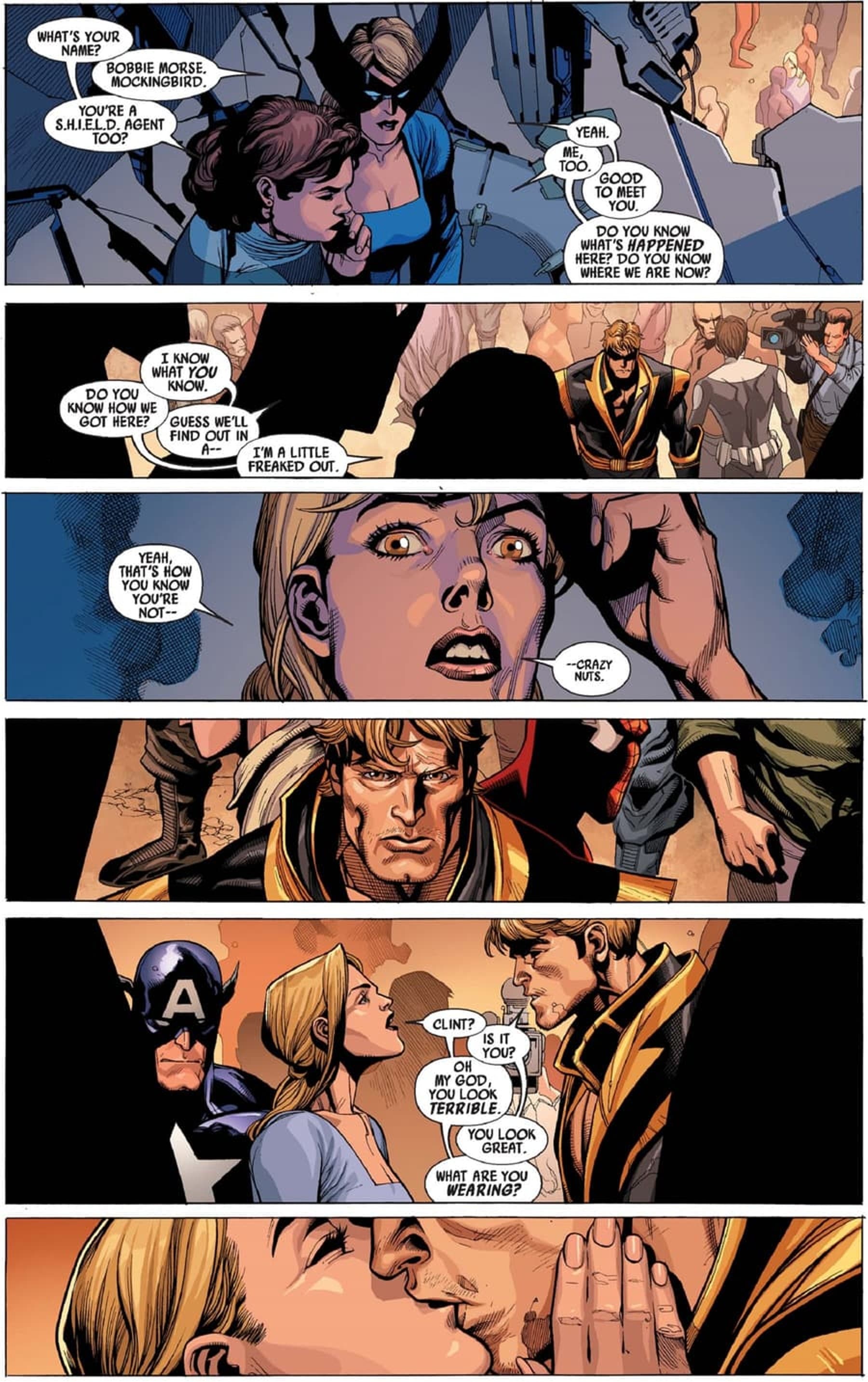
The Invasion Begins
Brian Michael Bendis (writer): [Leinil Francis Yu and I] got to practice a little bit together on these AVENGERS issues before we started on the main stage of the big thing. It also gave him time to figure out—you know, when someone's a Skrull, that's really interesting acting, because he can do physical hints without giving it away. Sometimes you would see postures and stuff that he was like, "That person doesn't stand like that." Because its comics, people don't always pay attention, but if you reread it again, knowing what you know, you'd be like, "Oh, you told us in the first panel!"
As a fan of that, I saw this as a grand opportunity to do one of those. I'm like, "Oh, this is one of those, like, you're reading in the moment and then you can go back and read it all and have a completely different opinion of it, so let's build it for that." Yeah, it was always on the mind.
Leinil Francis Yu (artist): I think my natural way of drawing is a good fit for it. My drawings are always of brooding and dark characters. I guess I was a good fit!
Tom Brevoort (editor): SECRET INVASION is uniquely itself, a very specific story. It had a very different feel and vibe to it than the other [events] did, which we tried to do with every one of these stories and events, and really, we try to do with every story that we would do. We'd do a new story AVENGERS; it would be not just the same thing again, but in some way, a little different than the last story we did and the next story we will do.
The stuff that Brian is typically most interested in is the interior lives of the characters, almost more than the external punching and hitting. It's been a long time since I've looked back, but I think we don't get out of the Savage Land in SECRET INVASION for like five or six issues. We spend a long time with characters grappling with this revelation and their feelings and whether or not they may themselves actually be Skrulls and not realize it or and whatnot, which is a very different structure than you would get in most of the others, because that's the stuff that Brian liked to sink his teeth into. So it's different in that regard.
Brian Michael Bendis: Wasn't it a nice thing that all the Super Heroes trust each other, even with masks on? They never went, "Hey, is that really Captain America?" to some dude in a Captain America [mask]. They all trust each other! There's just a sense of trust that permeates through the whole universe. And once, "Oh sh*t, we can't trust each other..." and then it's like, "Why do we trust each other at all? That guy is in a full body costume!" There's a lot of reasons not to trust each other.
Once the seed is planted, that part was a lot of fun. All you need is one person going, "Shoot, I don't trust any of you. I'm out of here!" Also, we had some red herrings. Jessica Jones' baby had green eyes in one panel—literally, the baby turns to the camera and goes green eyes and we were completely messing around.
Tom Brevoort: The premise itself tells you that it's going to be a "body snatchers" type of story, because we're saying it's not even just, "Oh, people are being replaced now"—it's, "People have been replaced and you didn't notice. So people you've been reading about in stories that you read six months ago or a year ago or—if a certain faction has their way—in 1977 have not been what they appeared to be." That's more disquieting to the readership, I think, than just the Skrulls coming down and going, "Tomorrow, we will begin our efforts to replace everybody!" Because that is an event that is unfolding before you rather than something that has happened.
Brian Michael Bendis: There are certain characters, like Spider-Man and Wolverine, that are constantly in the spotlight and they're never not published, and there are other characters, like Wonder Man and Spider-Woman, that would go sometimes a couple of years without ever having a book or a team or a place in the publishing world. So it was like, "Oh, that's someone who could have a secret, and you believe it because, yeah, I don't know where she was last week. She wasn't in a book." So that was part of the appeal.
Tom Brevoort: Even the characters are a little off-foot as to whether the characters they're standing next to—and have been for months or years—are the genuine article or not. There's a whole thread in this where Veranke as Spider-Woman half-convinces Tony Stark that he's been a Skrull for years and has just forgotten that fact, that something has gone wrong and he's lost his memory, but he's on side with the Skrulls. And for a good portion of it, you can't tell whether she's being genuine about that and real or whether she's just making this up and this is just another attempt to get over on the Avengers.
Brian Michael Bendis: Also, I'm a big Jessica Drew fan and I knew coming out of it—we had learned from HOUSE OF M on: yeah, the event is great, but it really is, "What do you get? What do we get when we're done?" And for me, it was all about DARK REIGN and Norman Osborn and I remember there was one point where I think [Editor in Chief] Joe [Quesada] said to me, "I'm so excited about Norman Osborn taking over the Avengers that I feel like I'm putting up with the Skrulls to get here." He was like, "I know you're all into the Skrulls, but I'm way more into this, what's going to happen next." And I was like, "Great, that thrills me," because not only did it empower me to get there, but I'm like, "Oh, well, then let me sell my boss on the Skrull thing. He's with us, but let me dazzle him here, too."
So I thought, "I'm finally going to get my chance to write a Spider-Woman series, and what a great idea for a series that this woman is coming out of captivity. She has been screwed over, and now not only is she no longer screwed over, but she's now in charge of getting the people that—oh, that's just fine genre material on every level, and I can't wait to get to it." So she seems perfect not only for the Skrulls, but for us as well and editorial, and then for what I wanted to do as a writer. So it really checked all the boxes.
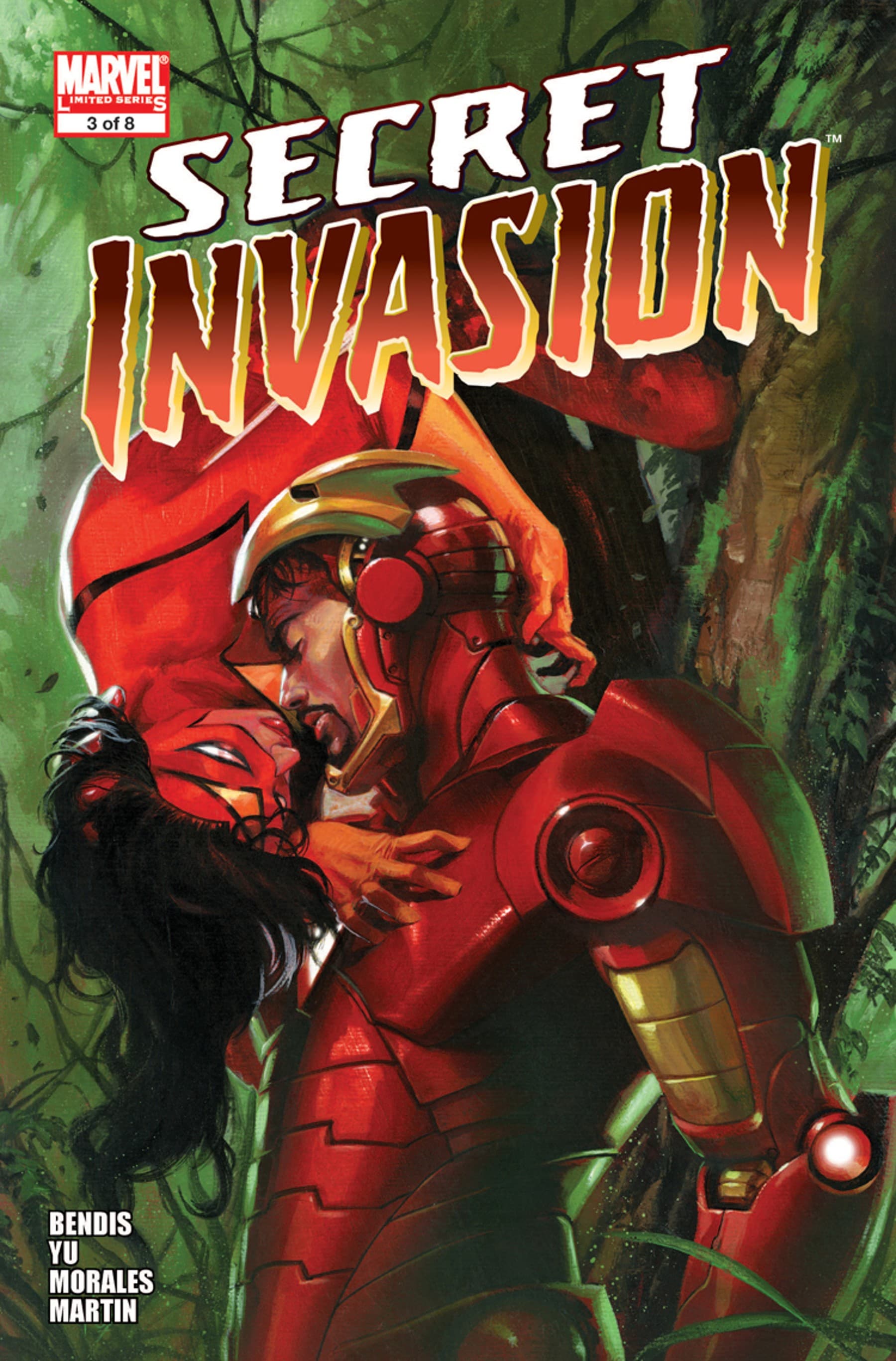
Dan Buckley (President, Marvel Comics): One of the things I love about [SECRET INVASION] is it's kind of campy and fun, but the underlying story of what's happening in that story is super heavy.
Brian Michael Bendis: I'm a big fan of "no one's the villain of their story" storytelling. We had applied that to everything we could think of, but having the Skrulls invade and like, "No, they're not here to do evil. They're here because they think that's what they're supposed to be doing." It's a completely different storyline and it's much more—I don't know, it's much more appealing to me as a writer. I'm much more interested in what the right or wrong answer is. So that was a big one.
I was happier that people bought into that part, because that was kind of an added thing, even though it was not totally added—there were hints of it all through the KREE/SKRULL WAR. Seeds have been planted all through the years of why they are the way they are, even going to [writers Dan] Abnett and [Andy] Lanning's stuff in GUARDIANS OF THE GALAXY.
The Annihilation Wave really created a ripple effect throughout the entire galaxy, the Marvel galaxy, including the Skrulls, [who] now have no homeworld. They have no world, and they have just their beliefs and they are scattered, and they have their beliefs and they have what they know to be true, which is a scripture that says, "Earth is supposed to be ours," or something a lot of them believe that's what it says. We know from how things work on Earth that that is sometimes all that people need to start their path.
Dan Buckley: They hit it a little bit in the Captain Marvel movie; they hit it slightly differently, but they were trying to get the same stuff. The metaphor you play with of not all [Skrulls]—one of the things I really—and Brian tried to hit it, and I think he did a pretty good job, because there was so much hero versus villain action, like who is fighting who in that—but not all Skrulls are bad, you have to really hit, and what could happen to a once powerful race if you its home, its very structure, and what you end up with is a culture that once considered—the leader of this movement, who was once considered an extremist freak, becomes the leader of the Skrull nation.
Because they had nothing, they turned to a religious extremist to lead them, to conquer and wipe out another race. So they're so searching for their own identity, and one of the other things fun with Skrulls is like, "What is their identity? How do you hold onto your identity if you're a shapeshifter?" There's a lot of cool stuff in that, from a storytelling perspective.
Brian Michael Bendis: I'm 99% sure I wrote the dialogue and then it was translated into Skrull with the idea "it doesn't matter what they're saying, just how they're saying it." But if you happen to know your Skrull, yeah, we have you. My wife is a huge Star Trek fan and if the Klingon isn't accurate, she can tell. Even though she doesn't know Klingon, she can tell when the actor is [guttural noises] instead of really saying words. She has said that to me, and I take that seriously and I know it to be true.
Dan Buckley: Brian hit it, but I don't think as many people picked up on that metaphor, but I think that book will carry on because of that metaphor in a bigger way than a lot of other events, where it's very much like, "The villain did this, and now everyone is reacting to the villain." There's always some underlying personal reasons why Loki did what he did, things like that, but this one's different. This one, it's about how a race or a species reacted when it felt like it was experiencing genocide.
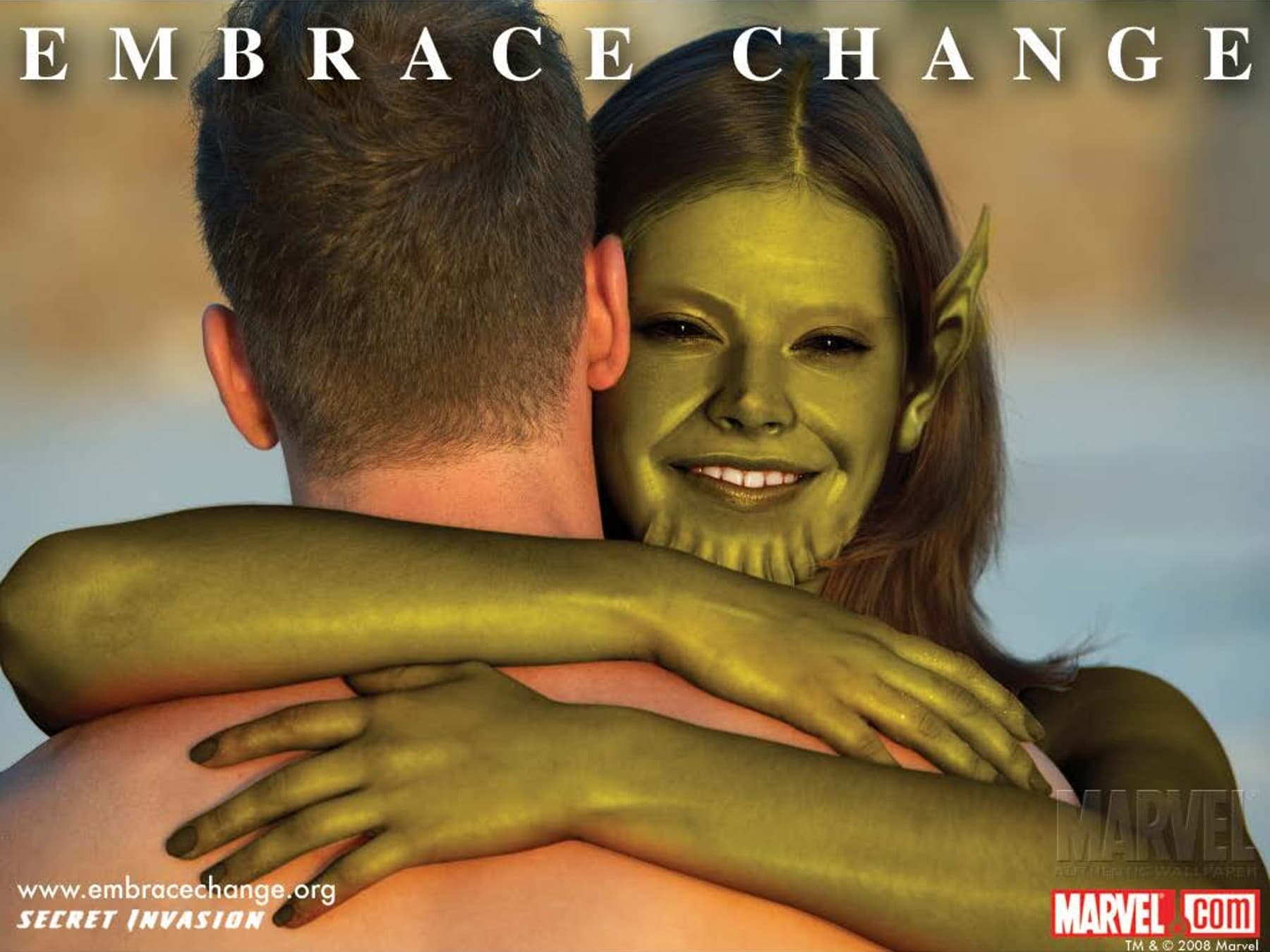
The Road to Dark Reign and Beyond
Brian Michael Bendis (writer): I remember very clearly when we started really getting to the place where then Norman Osborn takes the shot and changes the hero/villain dynamic coming out of this, and we had pointed to some real world historical times where it was… the right jerk at the right moment is sometimes what is needed, right? That goes back hundreds, if not thousands of years in history.
We thought sometimes that's the person who took the shot and then they get all the accolades and wouldn't it be interesting if... One of my ongoing concerns at Marvel is, "How big of a hole can you dig a villain out of?" I don't know why; I got very interested in the idea of if someone just decides "I don't want to be a villain anymore" or "I see it differently now."
But with Norman Osborn, it was different. Norman Osborn was very aware of who he was, up to a point, very aware of what his agenda was and what he wanted, and that he had an opportunity here to really turn the narrative around him, while at the same time sticking to his guns and what he wanted and how he saw the world.
This is one of those situations. It wasn't so much a villain turning it around so much as, "I'm going to manipulate the system to get what I want out of it, including branding myself the hero that you need. I'm not going to pretend I'm Captain America. I'm going to say, 'I'm better than Captain America. I'm a Captain America who is going to do this, who is going to get dirty, who is going to surround myself with Wolverines and go for it,' and maybe enough of the population would be into it."
Dan Buckley (President, Marvel Comics): One of the big questions you always ask about an event is, "What do I get out of it to drive the next story?" It isn't so much about the event; it's like, "What do you leave behind that everyone can jump on and go write a bunch of stuff about?" And that was a real juicy thing that came out of that, is that DARK AVENGERS/DARK REIGN stuff.
Brian Michael Bendis: It made me very excited. It's nice to have an ending that means something, that isn't just, "We blew up a bunch of stuff and high-fived at the end." You wanted to have a theme and a point and an ongoing. And, it's one of those ideas that has always been a concern that would happen sometimes at Marvel, that the reader wouldn't see the hero for the hero and the villain for the villain, and there would be a manipulation.
So, yeah, it was all building towards that, hitting all the beats knowing that's the payoff and that's where we're going. What I was very excited about that whole process was we knew, if the audience bought into it or not, it's a small, year-long window. You can't sustain it. It's got to be like a beginning, middle, and end. So I was able to craft not only SECRET INVASION, but a DARK REIGN shape that everyone could share and that we knew was going to wrap up for what would be SIEGE.
Dan Buckley: Having Norman do the kill shot was brilliant and being the hero of the story—it basically made the AVENGERS book into Thunderbolts. That was meaty. That's where SECRET INVASION has an after effect that is almost as big or bigger than CIVIL WAR's aftereffect, because it fed into both. We're dealing with like, "How much power can the government really have over you?" Norman abused that to a certain degree—not to a certain degree. Completely!
Brian writes the heck out of Norman Osborn; it's one of those characters that he just loves writing. You look at ULTIMATE SPIDER-MAN, and look what he did there brilliantly. There's some guys, they get into characters and they almost know them personally, and Brian has that with Norman. So it really made for a lot of great storytelling for a while.
Brian Michael Bendis: It was like it's all one big storyline and I know some people call it the whole DARK REIGN—I don't think I've ever earned a "saga," but I heard it referred to that way. So that was cool, and when I was thinking about talking to you about it today, it hits me how much hubris is involved on my end. I'm like, "Oh, we'll do this for a year, we'll do that for a year"—like it's a given! And sometimes you just need to have a little bit of hubris to believe in your idea, but when you come back on the other side, go, "Oh boy, I was taking a lot for granted!"
Dan Buckley: [Bendis] didn't want me to renumber it and call it DARK AVENGERS. He thought I was being horrible to the consumer. I'm like, "No, stop it. This is exciting!" This is a big deal. And it was! Even he quickly admitted that—he wasn't mad at me for long, because the first book sold so well, DARK AVENGERS.
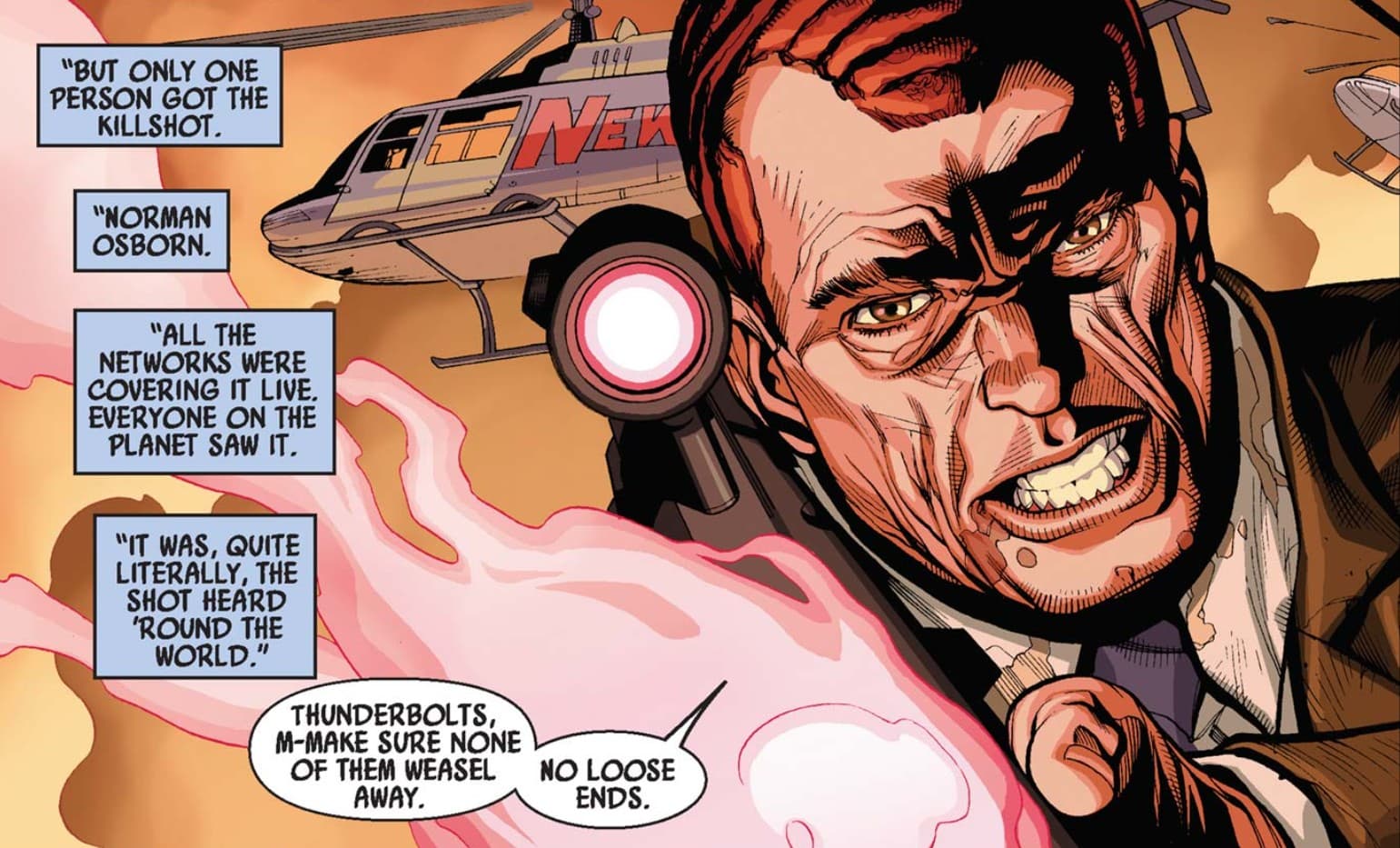
Brian Michael Bendis: But I will say, going back to SECRET INVASION and everything that went along, this is the part that I think is Marvel at its strongest. This is where, when we were right in the middle of the event and we knew we were headed towards DARK REIGN, all the marketing pivoted from, "Who do you trust?" to another level.
There was secondary marketing. There was a secondary campaign behind it and it was keeping people involved and invested, and this wasn't my work. This was the work of Marvel Editorial and Marvel Marketing and Marvel Sales, and everyone was really into it. They were having fun. They were coming up with creative ads, just creative interactions online, and the audience—even those who sometimes worry about event fatigue, which we've never seen but hear about all the time—they were constantly engaged, and I really appreciated that.
I say that because sometimes when you see my name is the first name on the credits, so I must have done all of this—I didn't. I wrote the story and I pitched the story, but there were literally, at one point, hundreds of people making this machine roll in a fun way towards the audience and that I was delighted and maybe a little emotional about it. When you think about your dreams as a young comics creator and the things that you want to do, and all of a sudden you have the entirety of the machine that meant so much to you as a child building towards this thing that you've been thinking about for years and years... it's kind of amazing.
Dan Buckley: There was two marketing hooks on that, and it is very distinctive. If you can see the marketing—[Senior Vice President of Marketing & Publicity Mike] Pasciullo did a great, unbelievable job. This was probably the best marketing stuff we did, between the masks and the logo. You look at the logo, the way it's presented, the backlit character shadowing, kind of creepy, but it wasn't so creepy that it was scary—it just wink, wink, nudge, nudge.
But you get into issue three and four, it becomes much more—you get into the story and feel heavier, and the marketing got heavier and it was very much more almost like playing with the idea of governmental propaganda trying to make something horrible sound fine.
Brian Michael Bendis: [DARK REIGN] was certainly in an early pitch. I believe that was one where I kind of got a verbal commitment that this is a way we could go before I committed to it. Again, Norman Osborn is the star of SPIDER-MAN. He's busy. There's other things going on.
One of the tricks of writing a team book, particularly a franchise book like AVENGERS, where you have maybe even every single character having their own solo title, I think it's important that I— the author of AVENGERS—deferred to the actions of the solo titles first. That's what's happening to the characters, and they react to it in AVENGERS. That was where I was getting my best stuff, right? But if I'm getting in the way of the stories, I'm not helping. I'm not making an organic, good, shared universe; I'm just getting in the way.
What was great is everybody signed off on Norman Osborn and the characters we were going to use. So it was very early on that this was going to be the solution. There was no other character that would be the person. It was always Norman Osborn. So we had that from the get go and were all always planning towards it.
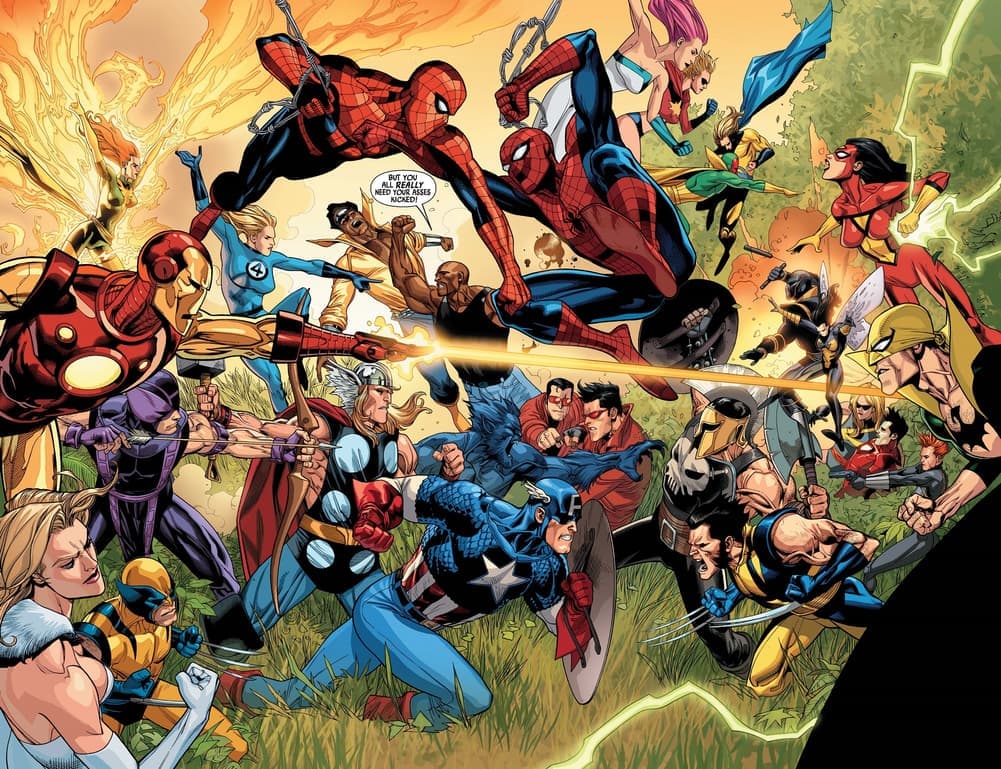
Tom Brevoort (editor): A lot of the crafting of the stuff that came afterwards and so forth resulted from conversations we would have in these retreats, and conversations Brian and I would have, and conversations that Brian and Joe Quesada—our Editor in Chief at the time—would have, and these ideas would spitball and grow and things would shift and adjust as we went, as I said earlier.
I don't know that Brian knew that that was the move he was going to be doing at issue #8 when he started writing issue #1. It was only at a certain point when that idea developed that he went, "Right! Okay, I'm going to that now. Everybody's really excited about this DARK REIGN idea. So we'll do that here, and that'll be how we kick this off."
Brian Michael Bendis: Again, this is all cyclical—but Janet [van Dyne, AKA Wasp] hadn't had a lot going on. Sometimes characters do; sometimes they don't. But it seemed a character I really, really liked didn't have a lot going on, and I wanted to give her some real moment. Also, we knew she's not dead; and we were always going to bring Janet back, empowered with a new agenda behind her. So that was always the case.
Tom Brevoort: I don't think it was a hugely controversial thing. [Janet] was an easy character to need her in here, in part because she wasn't really appearing regularly in a book. She was in, I think, MIGHTY AVENGERS at that point, but she wasn't so integral to it that you couldn't do the book without her. She didn't have a series of her own. Those are the characters who, for good or ill, tend to most easily be on the chopping block.
Plus, she's a founding Avenger, so that carries a little more weight than just somebody else, but in almost all of the big events series—particularly in that era—there was a strong impulse to, "You have to kill a couple of characters to make people take it seriously." Whether that was true or not, that was the feeling, and that's what ended up happening more often than not. So Bill Foster went to work that morning, thinking it was just going to be another Super Hero day, and ended up in a grave. But that sort of thing tended to happen, and that's entirely what happened with the Wasp here.
Brian Michael Bendis: I also knew, boy, even as a fan, let's take it easy on the fake deaths, right? It is false drama, particularly if you know the character's not dead. Sometimes you do think the character's dead and nope, nope, they're not dead. But in this case, I thought I was very clear: no body means there's a chance. I was playing by the rules of shared universe deaths, and no body, she has at least two or three powers that would have saved her from this, there's a chance she's alive. That was always the plan there.
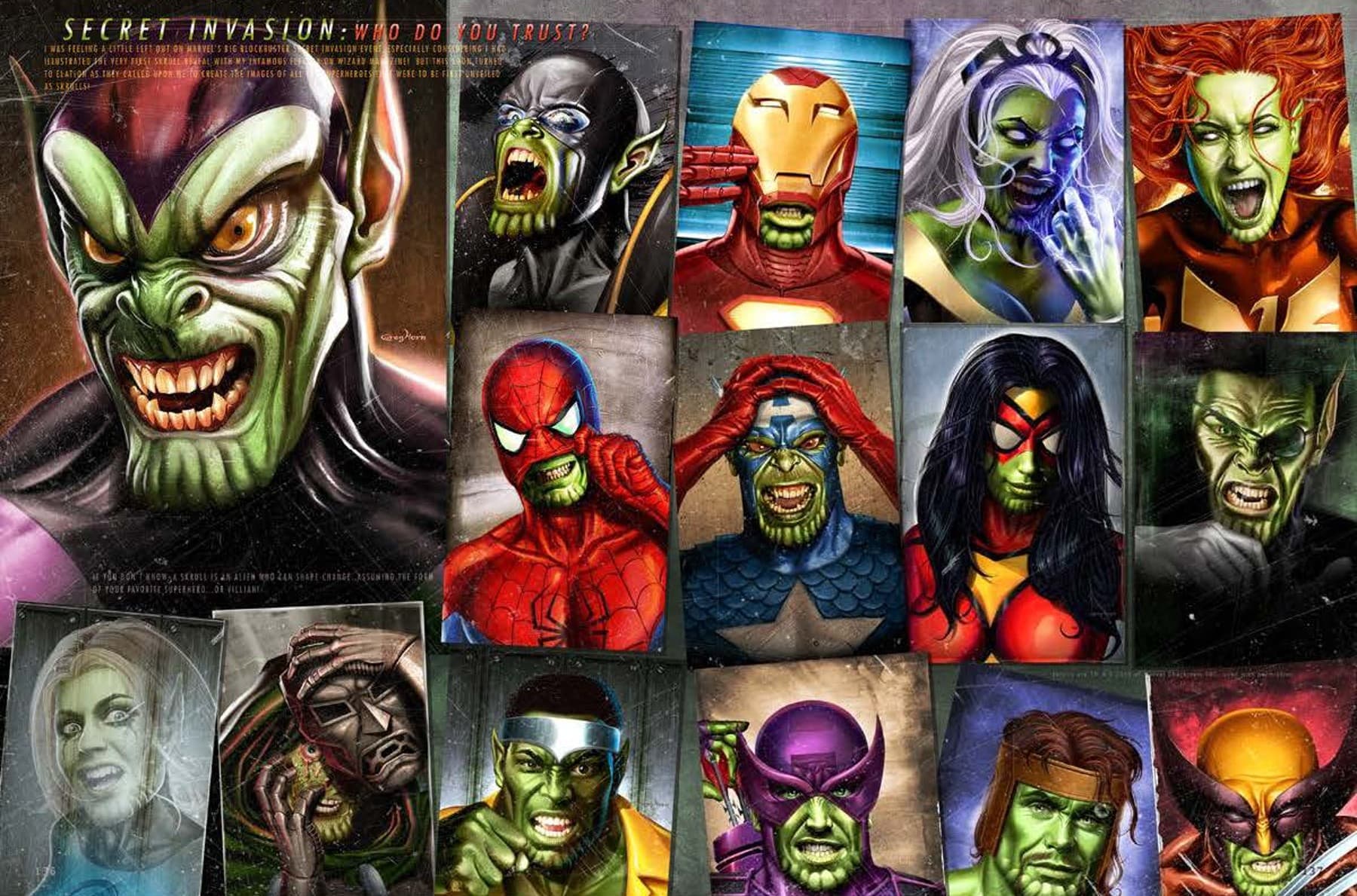
Who Do You Trust?
Dan Buckley (President, Marvel Comics): Out of the gate, CIVIL WAR just looked beautiful; the covers looked great. Everything was presented beautifully. But from thought-through marketing and when we hit beats at certain times, SECRET INVASION was by far the tightest thing we did.
Brian Michael Bendis (writer): The marketing was coming out of story, which is great, so I'm 100% part of the conversation. People who don't know and sometimes—you may have felt this—where, let's say, there's a movie and you see a trailer and go, "That's a great trailer, but not for the movie you're selling— [it's] the movie you wish you were selling." Good marketing is when it's actually marketing the thing that they already have with gusto, like it's pulling you towards it, and that's what they did.
Ryan Penagos (VP & Creative Executive, Marvel Brand & Franchise Management): I think there was a feeling of, "Yeah, this is exciting. This is cool." From what I recall, talking about these things in those creative retreats and updating broader groups of like, "Hey, this is what we're going to do to support. Here's how we want to do it." It was just like, "Yeah, that's great!" Or they probably threw ideas and kicked things around. If you're a creator, all you want is for 1. people to dig it, but 2. people to know about it. If you see everyone else getting behind you to be like, "Here's how we're going to push this in front of people in cool ways," it's great. It's exciting.
Tim Dillon (Executive Director, Marvel Marketing & Integrated Planning): You start with the story itself, which sounds obvious to say... if there's not scripts, you talk to the writer or the editor and you get an idea of themes or outlines and you just go through that and mine from in there, like what you think is—spoilers aside—very marketable or will hit the different audiences you want to hit. Because for us, it's very much the core fan but also retailers and press—Venn diagrams all overlap, but there are slightly different things we do for each of them, for the different groups.
On the eve of coming out of CIVIL WAR, we knew this could hit mass at the same time as well: "Oh my God! Blah, blah, blah—there's a Skrull!" We knew this could be big, so we wanted to go big. It's also looking at what's going to clutter bust or break through the noise; what's going to stand out?
Brian Michael Bendis: And again, everyone was a little empowered by CIVIL WAR. A lot of good things happened, some on purpose and some by happy accident, but a lot was learned and then all of it applied to SECRET INVASION. That's what I felt for sure, is that "Oh, yeah, we definitely know at worked here, here, here. Let's apply it right to there," including that social media question: whose side are you on?
Immediately, it was like, "Well, what's our social media question?" And it was so easy! "Who do you trust?" And then it became about that, and that is an equally good question for the Internet. Who's the secret bad guy? And there are so many players! I mean, we're talking about the entirety of the Marvel Universe, including all the supporting characters, all the Aunt Mays of the world, that now we have hundreds of candidates for people to play with and have fun with.
So yes, we pitched the entire story. We pitched, "Who do you trust?" I believe that might have come out of Tom Brevoort's mouth first. There was a lot to play with, and we had already scheduled when we were going to reveal certain things, and for the marketing people, that's exciting. There are little hits here and there to bump off of. From there, they took it away and they created all those Skrull-related—everyday Skrull ads, like lifestyle ads with Skrulls in them and stuff.
Tim Dillon: It was that mentality of, "Let's do something different. Let's do something fun." We don't really get these kinds of mysteries, for lack of a better term. It's usually generally like CIVIL WAR: it's fighting and punching, but this is a question and a mystery that we don't really get to touch in the comics a lot, which I learned at the time and have known since.
So we thought [about] what was big and what would make people stand up and take notice, and I think the start of that was the idea of anyone could be a Skrull, the "Who do you trust?", which I know is improper English that everyone brings up, but it still sounds better than, "Whom do you trust?"
It's going through the story, mining through it. Who's a Skrull? Big twists! They're invading the world—just taking those nuggets of ideas and either extrapolating them specifically or building them in a more digestible way. Because I'm definitely of the school of thought—and maybe it started here; I never thought about it—of selling the idea of a project and not always having to be exactly it—which is, again, obvious, but you see that with movies and TV shows.
This was our first opportunity of like, "Oh, we can make other materials. We can do more stuff. You see a kid play Little League baseball, but he's got a Skrull face." It doesn't happen in the book, it doesn't apply to anything, but that instantly sells you the theme and feeling of this story.
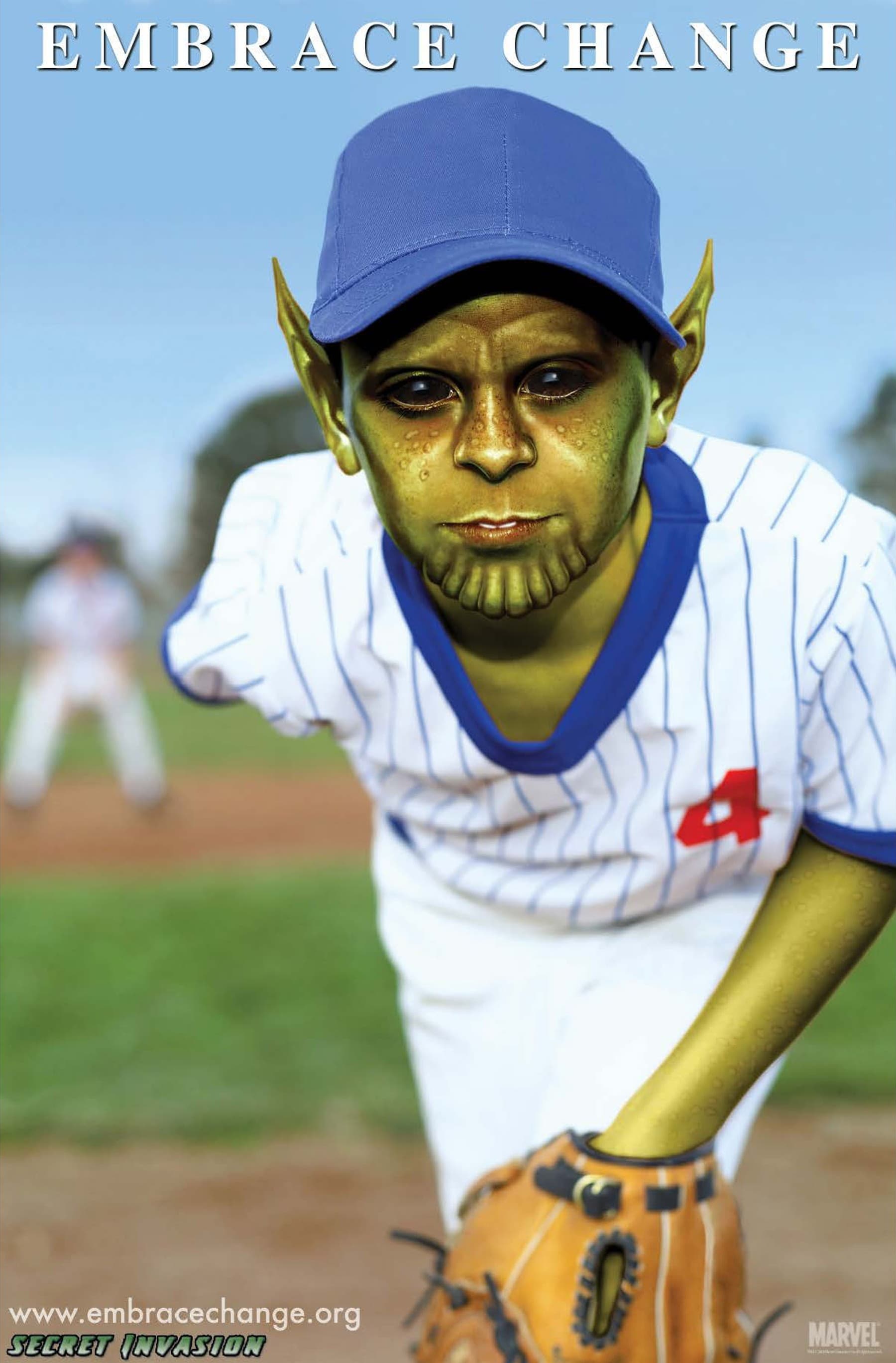
The Wild West of Digital Media
Ryan Penagos (VP & Creative Executive, Marvel Brand & Franchise Management): The Marvel.com team, similarly to what we do now, we were hoping to support every effort that the publishing team was doing with extra content, with ideas, with bolstering the marketing in ways that we could do uniquely with editorial pieces, spotlights, reaching out directly to our fans that were online. We wanted to do articles based on the marketing efforts. We wanted to make sure we had all the content up on Marvel.com. We were nascently on social media at that time.
Making sure that marketing assets got onto social media, that we coordinated with the marketing team to put things—you know, if we had to put them on message boards or our internal message boards, which we actually had at the time, things like that. So making sure all those marketing efforts got throughout places. Also, we were building unique content to go with it.
Tim Dillon (Executive Director, Marvel Marketing & Integrated Planning): We were still using MySpace and stuff at that point, which did actually work pretty well for a time, surprisingly. It was just that mentality of, "What's going to break through? What's different?" We started doing the stock photo stuff. The microsite came from it, the idea of leveraging the original digital comic at the same time—but it was very much like, "We can go big with this. Let's go as big as possible."
Dan Buckley (President, Marvel Comics): It was occurring at the beginning of social media to a certain degree. The timing lays out. So you're able to do a lot more of that cheeky stuff that went beyond the house ad in Marvel Comics—you know, CBG, CBR, Wizard. Wizard was pretty much ailing at that point, but Newsarama was probably still big at that point. So, you went from blog marketing to more like social outreach marketing, which I think SECRET INVASION lent itself to pretty well.
Tim Dillon: We had the confidence of Dan Buckley, who was publisher at the time. We had a marketing team, we had the sales/comms team, but also the first time that's when we really had, let's say, for modern Marvel, a digital team as well, which is how it got us working with John Sterling and Ryan Penagos predominantly, figuring out the digital aspects of things, of what's more we can do for this. It might have been our first microsite.
Thankfully, again, to Dan Buckley, we had the carte blanche to just like, "This is big. Do whatever you think will hit. Let's see what hits and doesn't hit." For each of those, we knew that stuff we were doing was much more [geared towards the] core comic fan and retailers and press would take notice.
Ben Morse (former Marvel.com editor): The idea was how can we use, first and foremost, the website, but also these emerging social channels and other sites like CBR or Newsarama to promote what's going on with Marvel Publishing. At the time, Marvel Studios was trying to have their first success. There was no Marvel TV. So it was really publishing was what we focused on a lot in those early years especially.
Ryan Penagos: The stories were inspiring all the people in the marketing and the publicity and the support teams, even in graphic designers and the production people. Everything about it felt cool and it was just such a great idea that people could sink their teeth into that it started getting us all really into it.
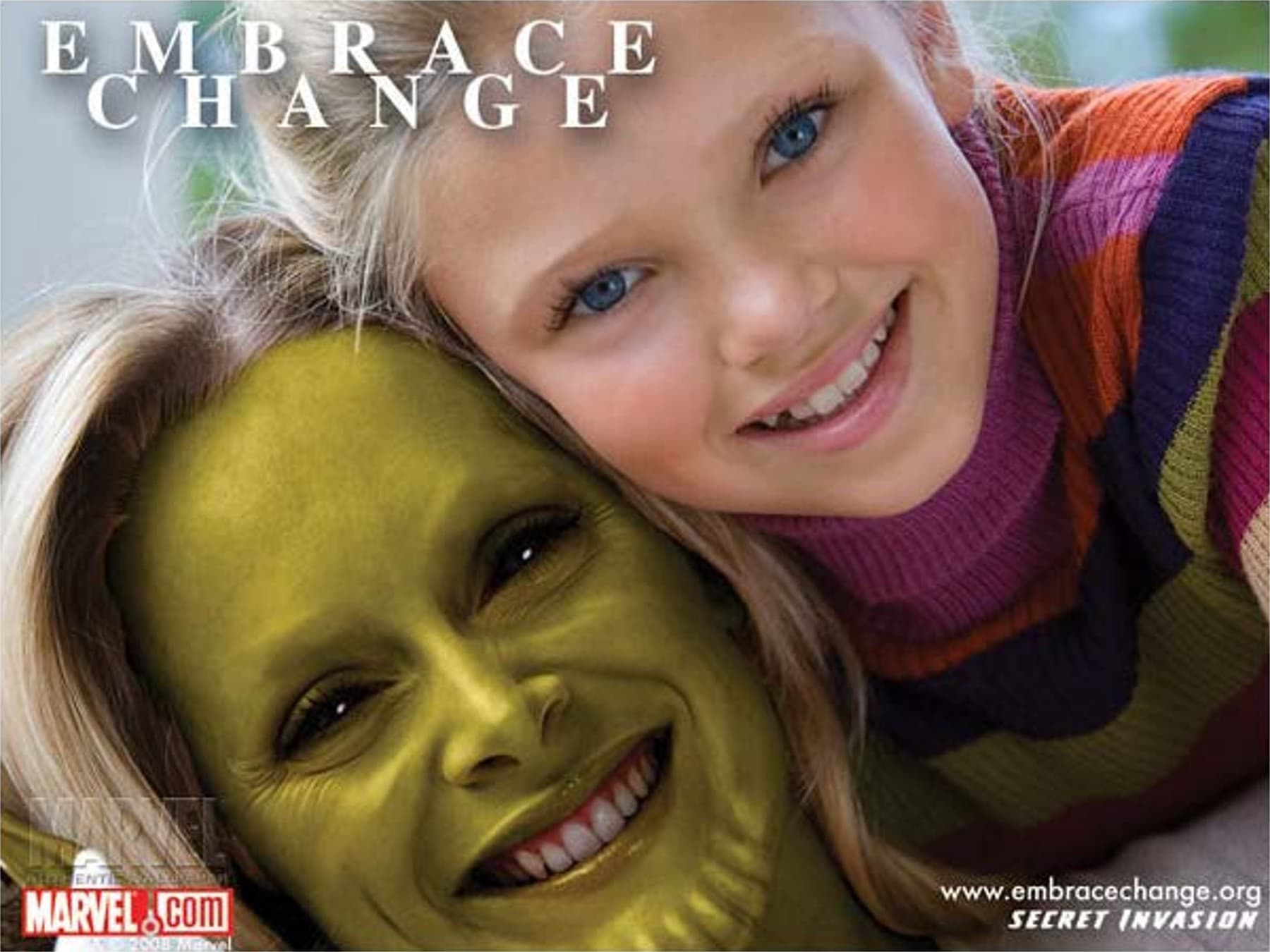
Ben Morse: This story lends itself to doing some nontraditional marketing, but it was more than that. It was less like, "Oh, this is the perfect story for this." Honestly, I'm just gonna be frank with you, it was more that I had just started and I wanted to do something different because I wanted to make my mark. They had just hired me. I was only 24 at the time, and I was like, "I really want to prove that I've got some cool, different ideas." I think Ryan was on the same page.
Ryan Penagos: I will say that the previous big event was CIVIL WAR and that also had a lot of that feeling, from what I understand, and that "Whose side are you on?" marketing was so good and so smart and obviously so influential to everything. I think it's hard to talk about SECRET INVASION without understanding the really smart things that the teams were doing for CIVIL WAR beforehand and how that revved the engine and got us just rolling.
Coming into SECRET INVASION, it felt different. It felt cool and new, but at the same time, we were on a train that was going really fast. Everybody's jumping on and we're just putting rockets to the train and keeping it going and building and building and building. So it wasn't like we were starting from scratch. We were starting from a place where we're all excited, we've got great ideas, the creators are doing amazing stories—let's go!
Ben Morse: Me and Ryan, even though he'd been there for a year, we were both like, "All right, this is our first big event we get to do with our marketing and our web technology." And, just the idea there's social media and this is something that they didn't have even when they were building CIVIL WAR or anything that came before it. We’ve got these tools; why don't we do something different with them instead of just interviews and scorecards and stuff like that? There's potential to do more.
So it was less of a, "Oh, SECRET INVASION is the perfect story. Let's do this!" It was more of a, "Alright, we're new. We have stuff. Let's do this." And then once we started applying that stuff to SECRET INVASION, we realized that "Oh, SECRET INVASION is perfect for this."
Dan Buckley: If you paid attention to the events you're doing, you could do marketing programs that are much more customized to the event itself. SECRET INVASION, it just gave you that ability to do a lot of that, where you could play with the Skrull masks, you could play with that propaganda stuff that Mike [Pasciullo] spent so much time on, which was crazy. I remember walking into his office and he had all these Getty Images at his desk and working with somebody to Photoshop in Skrull heads. David Gabriel had to share an office with him at that time, and... the papers were just overflowing.
Tim Dillon: I think we saw the Greg Land cover first. We ended up doing a ton of variants with those, but at first, we just saw one and we were like, "Oh, that's really cool and creepy." I think that's why we ended up doing 19 or 20 more from there. But there was this one originally that came in and we saw was like, "Oh, that's really cool! That sells it very well." We did more of those and we were like, "Yeah, but this doesn't really work for a mainstream audience." It's like, "Oh, it's going to be comic art and that's just an alien."
That's where we played with getting stock photos and altering them and tweaking them, even if we just placed these in ads. It wasn't the same way back then. We had social media and our handles and everything and we pushed stuff out there, but it wasn't the number one way for people to learn and see stuff like it is now. But it was the dawn of all that stuff.
Dan Buckley: [SECRET INVASION] just lent itself to a lot of customized messaging and fun. I think, because it was at the precursor of that beginning of how you can leverage the social media networks, it was probably the beginning of that experimentation, where we don't do a lot of print anymore. Most of our marketing is very digital dependent and it's much more sophisticated on the digital side than even then, but that was the beginning of it. It just allowed you to customize—because there was so much stuff that you could do that was either tied to the stories or just tied to the high concept.
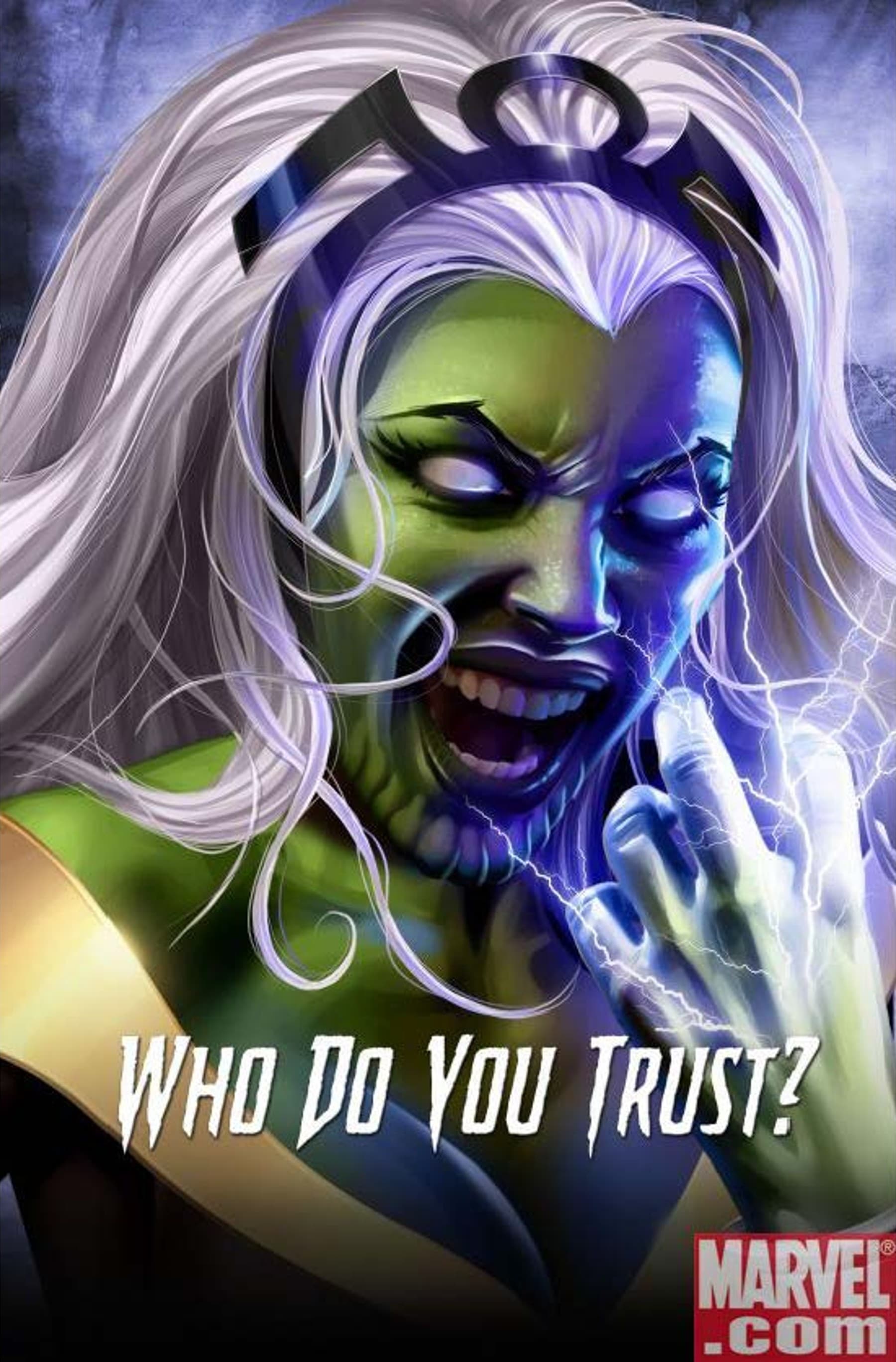
Ryan Penagos: With social media, you get a very direct connection to fans. Not everybody was joining social media yet, but those who were felt like they were part of something different. When we could put out stuff on social media, that was really cool. The MySpace of it all—obviously, that was a big part. MySpace was still very large at that time, and we utilized MySpace in really cool ways. That was fun, unexpected, kind of hard to quantify if what we were doing was A. good, was B. successful, but we got to do it.
Ben Morse: I teach a class in social media now, and one of the things I always impress upon people is prior to social media, the Internet was very much like a bulletin board: you post something and hopefully someone sees it. Social media changed everything, not just in comics marketing, but marketing period. The idea that everything is now a two way conversation: that's what podcasts are, that's what Twitter is, that's what all these things are. You're talking to someone and then responding based on how they react.
SECRET INVASION was very much about that. We were like, "All right, how can we not only create something cool, but make it something that the audience can actually interact with?" So you're not just reading a comic once a month; you're reading a comic, you're going online, you're interacting with fans, but also interacting with creators and just picking up this stuff.
Ryan Penagos: We had a lot of freedom and a lot of opportunity to just try things and only answer to ourselves in a lot of ways, like, "Does this work? Is it good? Does it benefit the story? Does it help us as a company to get people excited?" Yeah, because it was getting us excited. So social media was a part of that, but I think it all blurs together as just like, "Here's all the cool stuff that we're getting to do."
We were working very closely with the publishing team and saying, "How do we jump off of everything you're doing and just do cool things?"… the idea of like, "Okay, so what if the Skrulls took over, or were trying to take over? How would they do this in the real world?"
Ben Morse: We didn't come up with Embrace Change—that was a marketing thing—but we ran with it... This was kind of our thinking, was if the Skrulls were here in the real world and they have this basically almost religious agenda of Embrace Change, this is what they would do. They would have their own website; they would have their own marketing campaign.
So as silly as it sounds, we thought of ourselves like, "What would we do if we were the Skrulls? How would we be trying to persuade the people of Earth that not only is this inevitable, but it's also this is good for you?" Really trying to sell people on Embrace Change at the end of the day. I don't know who specifically came up with Embrace Change… but it really worked, and we were able to build a lot off of that idea.
Ryan Penagos: So the Embrace Change [microsite had] wallpapers where we would have one of the people Photoshopped to have Skrull makeup. Those images, which you can see in some of the collections—we had those as wallpapers that people could have and told people to tell them about the mission. The more people you know, the easier it becomes. We had to explain to people how to save wallpapers on their computer.
Tim Dillon: We'd already started exploring the digital space with some narrative stuff with digital comics and a few other things. I don't think Marvel Unlimited had launched, but it was one of the first few times the question was, "How do we take storytelling off the page and move it to digital or somewhere else?" What everyone calls now transmedia promotion or whatever.
Ryan Penagos: AIM buddy icons! That's a thing we did. I remember we were all using AIM to chat before Slack. You could have an AIM buddy icon of Embrace Change, brought to you by the Skrull Koalition Running Under Local Law Campaign: S.K.R.U.L.L.
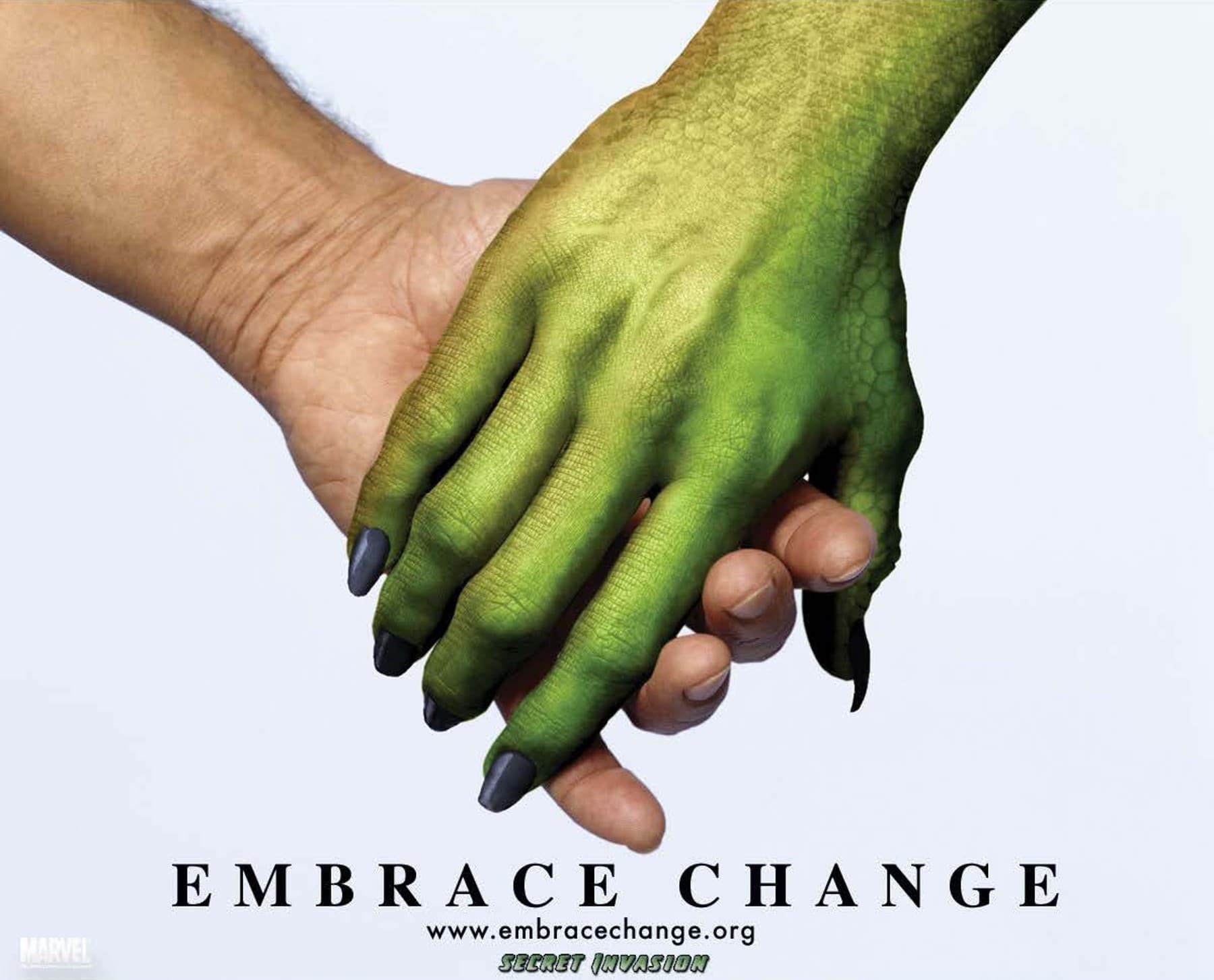
The Kismet of Kinsey
Ben Morse (former Marvel.com editor): MySpace was pulling in whatever they could to stay relevant and one of the things they did to try to stay alive was they separated into groups. You had MySpace Sports, MySpace Movies, and MySpace Comics, which was run by Sam Humphries, who would go on to write for Marvel and DC. But this was the first time I met Sam. He was running MySpace Comics.
Me and Ryan met with Sam, and he was just like, "Yeah, we want to do something different." Now, I was—at the time—dating the woman who would become the wife and the mother of my children, but she was my girlfriend at the time. She's a theater major, and she was super into this web series called Lonely Girl. So Lonely Girl was this—I think it was on MySpace. It was on Facebook. It was on YouTube. But it was this girl who was doing a video diary of her life and just like, "Hey, this is me," and so on.
Then, in the background of what was going on, you had these weird subplots and she presented it as being completely real, like this is a real person doing a real video diary, but there's this stuff going on with a cult and there's this stuff going on with all these weird things that she casually mentions and brings them in. Then, after—I don't know how many months, but months of building up this audience that was like, "What's going to happen next?", they revealed that she was not real. She was a fictional character, and hey, if you've enjoyed following this girl as she's gone into this crazy world with her friends and her family and all this other stuff, we're now going to be producing a full-on Lonely Girl series that you can watch.
Again, my wife loved this. I wouldn't have known about it if it weren't for her. But for some reason, it stuck with me, this idea of doing something where we used our platforms to create something that seemed genuine but was really taking place in the Marvel Universe, and then at the end of it, we flipped the switch and said, "Continued in SECRET INVASION." That was always what we were building to.
I pitched this to everyone. I remember a big person who was really behind it was Mike Pasciullo, who passed away last year. Mike was a huge supporter. He was basically the one who handed us the keys and said, "Go for it." But I pitched this to Ryan. I pitched it to Mike. Gradually, eventually, it got up to Joe Quesada, Dan Buckley, Bendis. We needed to get full approval on this to get it done because it was going to be such an immersive thing. But once I got the go ahead, they're like, "Yeah, go for it," and I was like, "Alright!"
I don't mind admitting we were totally ripping off what Lonely Girl did, where I said, "We're going to have this girl and she's going to be giving basically like a video diary of… getting ready for prom or something like that." The idea was, "Alright, we follow this girl on her video diaries. She's getting ready for prom. We introduce her friends, and in the background, we see that something weird is going on with her brother." That was the big thing.
But we also put little like Easter eggs, so if you were paying close attention, you could figure out that this was taking place in the Marvel Universe. I remember a big one we did was her brother went to Empire State University, which is not a real college. It's a Marvel college. We just had a little thing like that in the background. So, [my wife] Megan Morse—Megan Sherlock, at the time—played Kinsey. I forget where we got the name from. Kinsey Walden was her name.
Ryan Penagos (VP & Creative Executive, Marvel Brand & Franchise Management): The rub there is how do you tell people without telling people and you're trying to keep this a mystery and a secret? So we had that almost—it's kind of found footage mixed with ARG type of things, like augmented reality games, but it wasn't a game.
Ben Morse: The other key component was Rickey Purdin; his girlfriend Sam was a film major and Megan was a theater major. Basically, Rickey and I were like, "Can we use your skills to create this thing?" Sam was the director. I wrote everything that was going on. Megan kicked in ideas. We had a couple of Megan's friends from theater school came up and played the other parts, like her best friend and her brother.
I'm writing this. Sam's directing it, Megan's starring in it, and we're just doing it and we're just doing it really guerilla style. We talked to Sam Humphries over at MySpace and he's like, "We're going to host this on MySpace. We're going to put it on the front page."
Ryan Penagos: We put up a profile on MySpace and they created a series of short videos—very, very, very low-fi—of this girl and she's dealing with stuff and her brother and all this other [stuff].
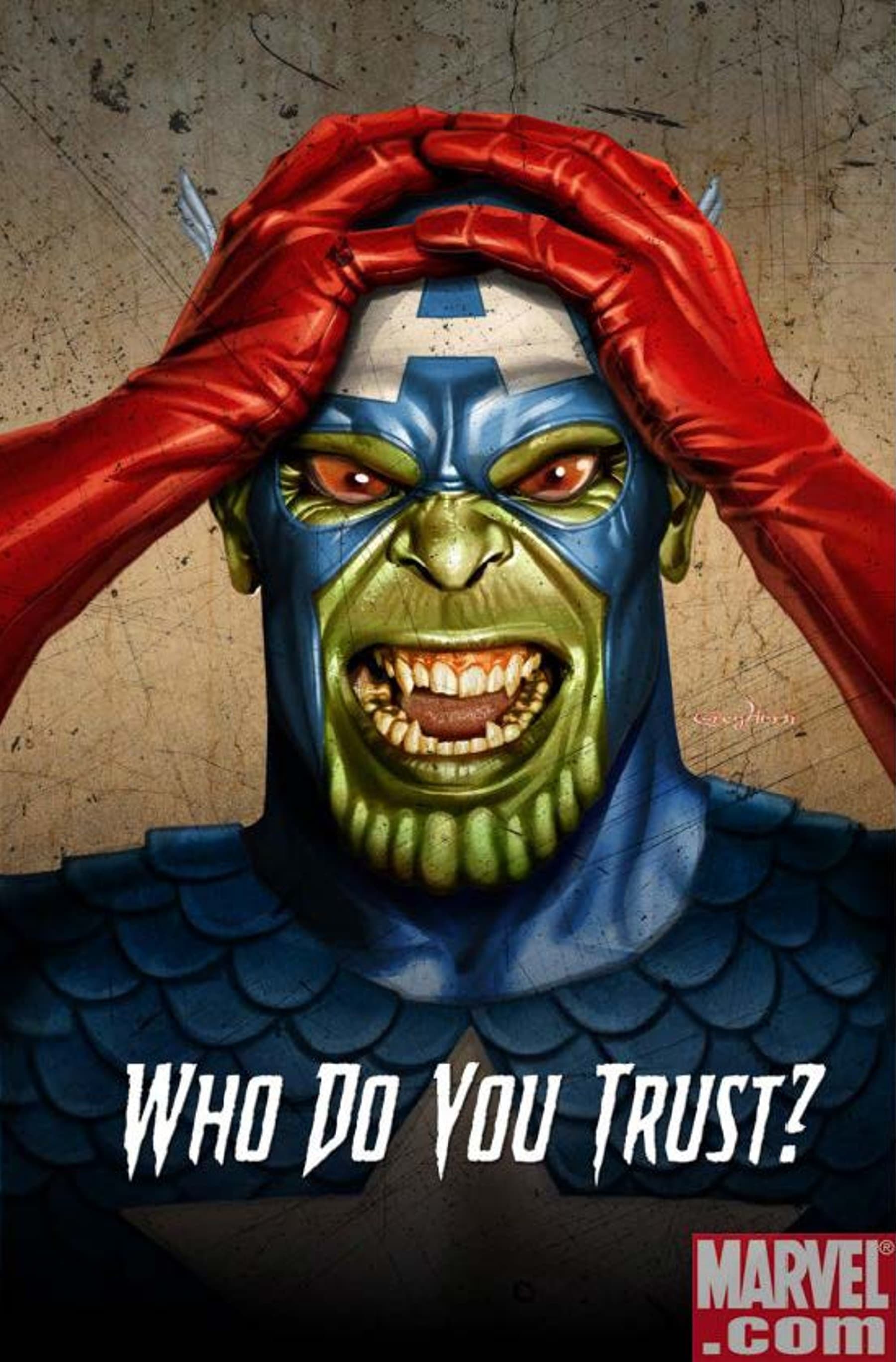
Ben Morse: Jim McCann came up with the idea of, "We're going to let it build a little bit on MySpace, but then at some point, we're going to let comics press know that this is going on, but then they're going to act as if they discovered it." So CBR did an article like, "Whoa, look at this thing that's going on over at MySpace. We think it's something tied to Marvel because we noticed this Easter egg in this thing and this thing."
So then gradually, it got a lot of views because it was on the front page of MySpace Comics, which was not insignificant. We were suddenly pushing it through Marvel channels and eventually, the comics press got a hold of it. But it was cool because we achieved exactly what we wanted to, in that some people thought this was real and were getting invested and they were messaging us and going through the whole thing. But then once comics fans got a hold of it, they just loved it because they were like, "There's not been anything like this, prior to this."
Ryan Penagos: But the idea was to just create a story of like, "What if this is happening around the world?"—that idea of, "Who do you trust? Anyone could be a Skrull," taking that and putting it into our realities was something that wasn't really being done, and it was something that we could do in a unique way. We could do it ourselves.
Tim Dillon (Executive Director, Marvel Marketing & Integrated Planning): It was, again, leaning into the themes and big beats we knew from the series and just kind of like—you know, like with any story, what would other people understand? What would they instantly get? Like, oh, a family member is this! Somebody could be this! I think that's where the generation of it came from, and at the same time, it was like, "Let's do this, and it might get picked up. It might not. If it's not, maybe we leak it to somebody." It was that kind of thing.
Ben Morse: It was very much the marketing people saying, "Go do whatever you want. This sounds like a cool idea." I think that once Bendis was on board, that was a big deal, and they just said, "Go do whatever you want." Mike, especially, was like, "Whatever resources you need!"
Ryan Penagos: Other than making sure that publishing, marketing, the company itself was cool with this, we weren't dealing with a lot of oversight. We were just doing stuff to do stuff, and if it was cool and it worked, great! If it didn't, oh well, we tried. So they built this fake profile, all these videos and stuff, and they released them over a period of time. The idea was, at the end, you would get this shocking reveal that one of the characters is a Skrull, and it's like "AH!" I believe then that segued into a comic book, a comic story.
Ben Morse: The final episode was the big reveal of the fact that the brother was a Skrull. When I came up with the idea of doing Kinsey, I didn't think to myself, "Oh, we're going to have to do something like that." It literally was—we got one of the cardboard Skrull masks that they were giving out at conventions, which we threw this guy under it. Our special effects were turning the lights off so you couldn't really see anything, and then we just did this huge reveal. Then, at that point, we knew that it was going to be continued in the comics, which we didn't know when we started.
Ryan Penagos: We did this original SECRET INVASION: HOME INVASION story on Marvel Unlimited, and so we were utilizing digital comics, digital platforms, digital ecospheres in a way that we didn't really do before. So, to your point, this was new and fresh, and we were just like, "Why not use all this stuff? Why not try?" So that's where we were.
Ben Morse: That was something I wish I knew who came up with that; I want to say Tom Brevoort was the one who said we should really continue this afterwards. We didn't know at the beginning that it was going to continue as a comic, and then it did, and it ended up being one of the first digital exclusive comics that we did, like the grandfather to what you guys do now on Marvel Unlimited with the Infinity Comics. We would post a panel on Marvel.com every two days and then eventually it got collected into a print edition. Then, eventually, the print edition became a trade paperback.

The Staying Power of Physical Media
Dan Buckley (President, Marvel Comics): [Mike] Pasciullo isn't here to give you the details, sadly, but he was a big reason why it was so fun. He just grabbed the bull by the horns on this thing and he came up with all those Skrull masks and all that cool marketing that you saw. He was annoyingly dedicated to making it happen.
Ryan Penagos (VP & Creative Executive, Marvel Brand & Franchise Management): The masks, I would guess it's Mike who came up with the idea for the masks, because it's so good and it's so fun. The idea of having these masks that you could put on. We were giving them at conventions. We were trying to give them out to people and let them use them. We had stacks of them in the office, and if we had visitors in the office, we would make sure to give them to them. If we'd go to events, we'd give them to them. The idea of spreading this around and letting people have fun with these things was cool.
Tim Dillon (Executive Director, Marvel Marketing & Integrated Planning): I remember the whole process of making those Skrull masks was an ordeal because we had to be cost conscious and I had to do this in thousands.... It was a whole process. I don't think we understood—again, now it's super obvious because everyone's running around for interactive swag or stuff to show—but how popular they were at the cons. People came to the booth just looking for them. You saw them walking around. It's easy to say now, but 15 years ago, not only was it still—not the dawn of social, but it was exploding more in a way that it never had before. It opened this whole new avenue to talk to people that we didn't have an angle in it before.
It really surprised [us] how much people wanted stuff like that. It was the first time we encountered it, because I personally would be like, "I'm not going to wear this or walk around with this," but people in cosplay were wearing them! That was cool in regard.
We ended up going to print with them a few times for cons. I think we even kept them into the next year, even after SECRET INVASION was over. That was a big thing for us; that was a big hit and also led the way to us doing more different premiums for years to come, in stores, but also at conventions. We were exploring and figuring out new things and we just did whatever we could.
Ryan Penagos: I think, if I remember correctly, there were families who had them, so they would put them on their babies and little kids. I had them. I remember Scott Adsit visited the office once and he's a huge Marvel Comics fan, huge [Jack] Kirby fan, so he loved Skrulls. I have a bunch of photos of him just messing around in the office. I shared, at the time, of him doing Jack Kirby poses with a Skrull mask on... We had them at conventions and the whole panel room with Skrull masks on.
I think it just helped everybody feel like they were part of this cool thing in a new way. Also, we love little weird collectibles. A little mask seems simple, but it's a neat thing, and it's a snapshot of the time in a lot of ways. So yeah, I think fans really glommed onto it and we had a lot of fun with it. You would walk around the office and we would just be doing stuff with the masks. You'd see people all around, being silly.
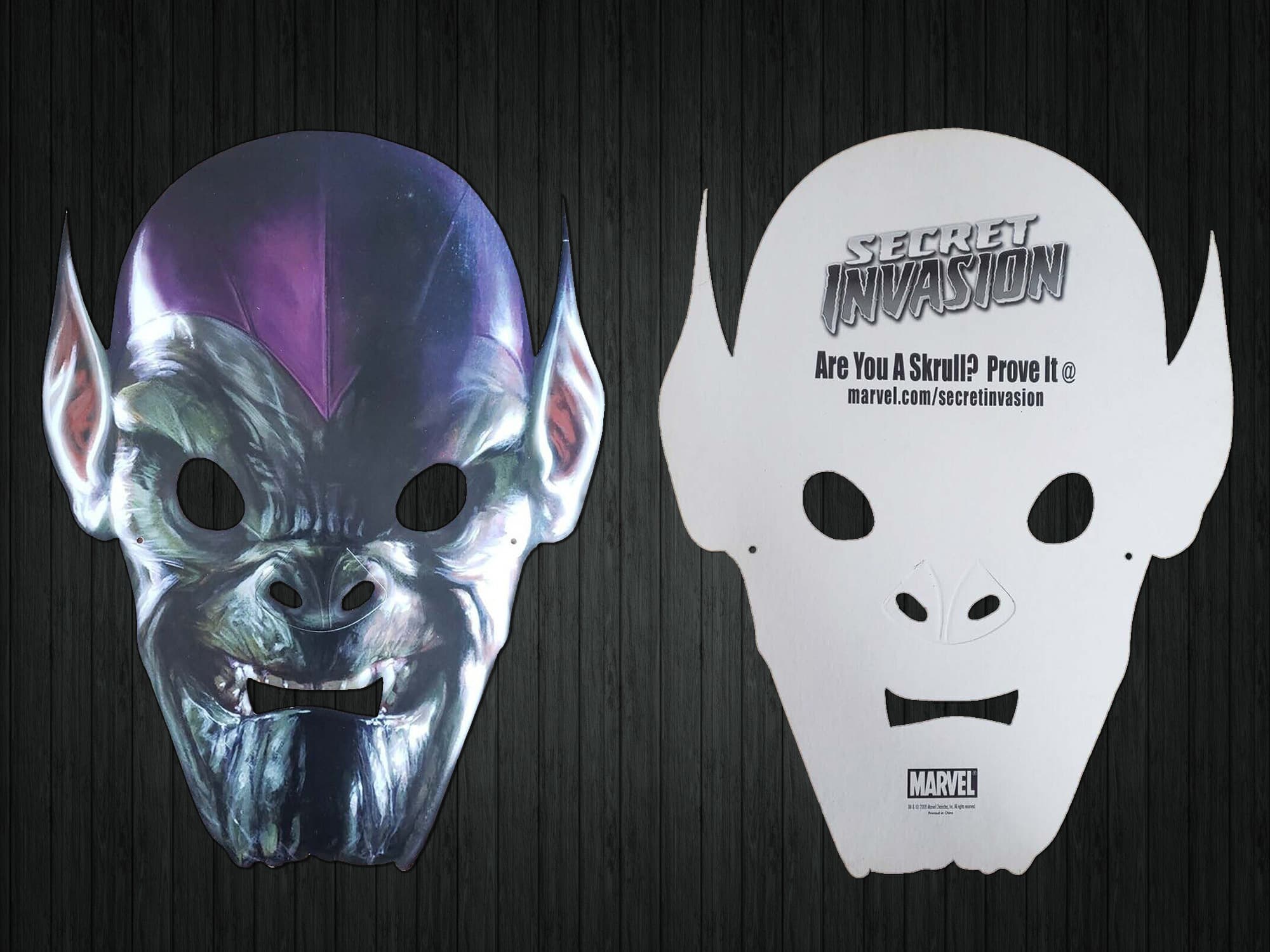
Tim Dillon: Then there's things like the stock photos. We knew once it got out there, people would pick up on it en masse. At the same time, we were laying in with the comms team, Arune Singh, press hits, and interviews. Coming off of CIVIL WAR, we had the green light of like, "Go bigger, go crazier" and took advantage of it. Thankfully, I'd say most of it hit well.
I think the Photoshopped ads were really cool and different and nice. It'd probably ten times harder to do now than it was 15 years ago. But those came together, and credit to the designers at the time, which I believe were Jeff Sutter and Rich Ginter. I think Rich started then, or maybe he came up—or at least Jeff Sutter was part of the design team then. Just successfully making them creepy, like that creepy of like—we were doing the Americana, slice of pie, very standard images and stuff you see and then applying that weird twist to it, again, because the Skrulls could be anybody and your neighbors and your family.
We were also assuming the position of, "Oh, they won and they're everywhere. It's fine." I think those just really hit very well and succeeded in raising questions and being like, "Oh, this is weird!" Unsettling in a good marketing way, for lack of a better term.
Ryan Penagos: I think [SECRET INVASION] probably opened our eyes—opened my eyes—that we should use social media more. We can use video more. We can use all these different tools that are emerging in new and exciting ways and that fans are here. If we do stuff that's cool, if the content that we're building off of works, then they're going to be into it.
It was just like 2008 technology and figuring out what works and then trying to think about how we can use this more and more later. You look at like the CIVIL WAR campaigns for the film years later, jumping off of a lot of stuff that was built from both the CIVIL WAR comics and even the way we interacted with fans with SECRET INVASION. We built the foundation and then they turned it into a skyscraper. So I think that part is cool. We were doing stuff back then that influenced a lot of stuff in minor ways, but it helped pave the way, which was cool.
Tim Dillon: I'd say, if anything, [SECRET INVASION] actually formed how I came [to think of] comic marketing, because again, I started May 2007 full time… Coming in in May and knowing it was starting the next year, it was the first full lifecycle of a big event I was on, because CIVIL WAR had just wrapped or was about to wrap when I started. I think it really formed like an approach of how to do this, how to treat this.
That was all led by Mike Pasciullo, of how to do this, because he had come on as VP of Marketing in 2006. He'd been at Marvel back in the day, but he'd just come off of doing sports marketing and agency stuff for a few years, so he brought that newer, fresher take to things. I think comics marketing can sometimes get very—even happens every now and then—stagnant, like with all marketing—a lot of people wouldn't admit it, but look to see what other industries do: what works there, what doesn't work there—a good mentality we developed early on of like, "Oh, that works over there. Let's do this." It was like, "Oh, people do microsites? Let's have a microsite so people know where to go to!" Adapting things that way.
Some people like to be very boxy with what marketing stuff is, like, "Well, that's print marketing!" I think that also helped, in just the way Marvel always being less of us, it's all marketing, it's all promotions, whatever tag you want to put on it; it's just the different avenue of which you're distributing and putting it out. The articles for all of the books is marketing. The social assets are marketing. It's just figuring out using whatever the distribution or channel method is, what is the best asset, info, creative, whatever for that. So just taking that bigger, wider approach with things based on the hopefully good content.
I'd say that's what it formed for me, for the comics, and thankfully, that ended up applying and working when I went to work on the movies as well, and then the TV shows. I'm older now, so I understand it, but younger [me], back in the day, where it's just like, "Oh, this all applies. It's just different scales of things." It's not that different working on this TV show or movie or audio podcast, most recently. We're just talking a different number of zeroes and numbers on the other things, but again: approach starting with the content, go big, and do whatever you can with it from there.
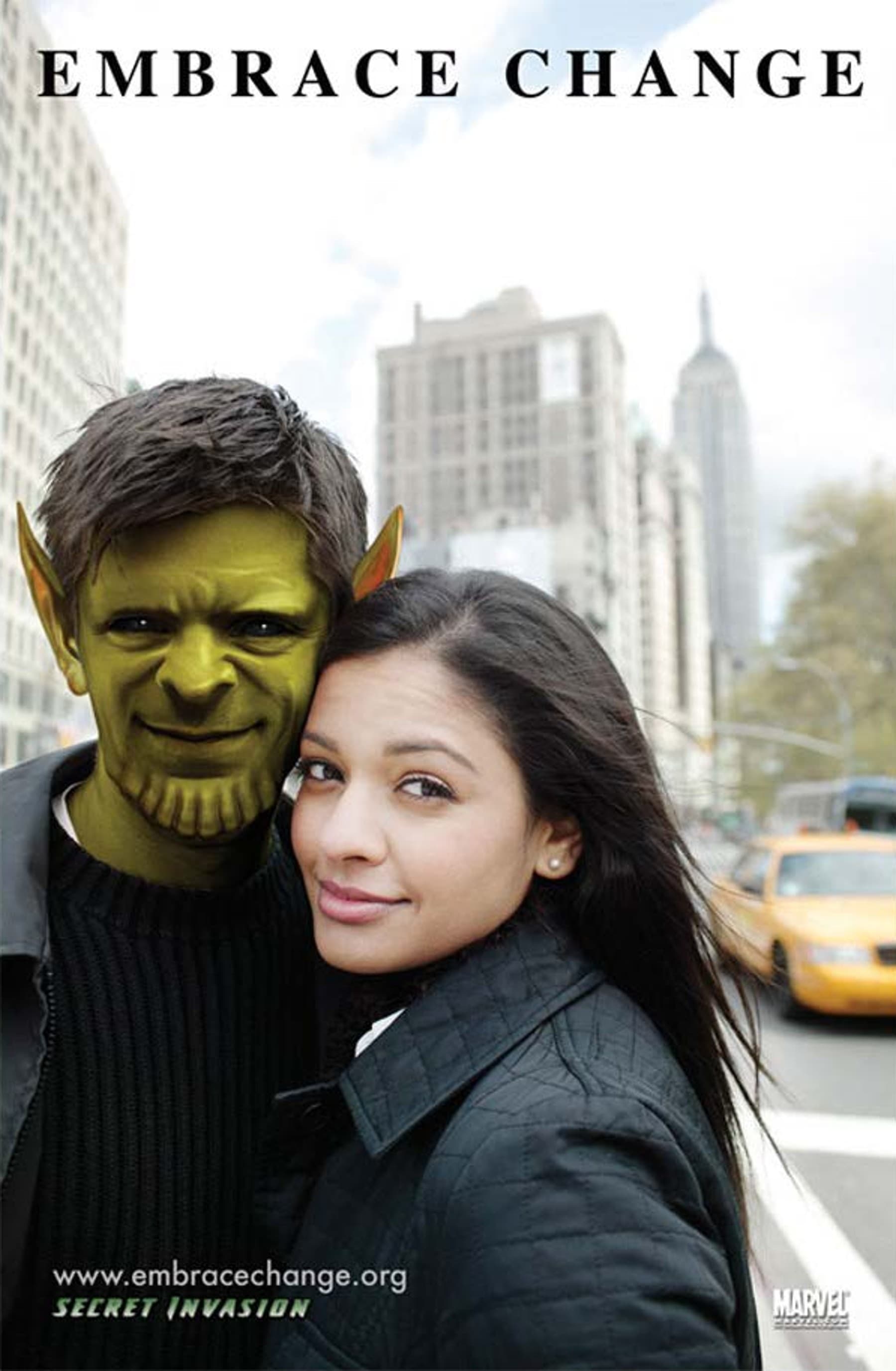
A True Team Effort
Brian Michael Bendis (writer): Going back to my pitch of NEW AVENGERS, I was aware that the MCU was about to happen. I was part of the room in Iron Man and Iron Man 2; I knew what was coming. I knew what Marvel had the legal rights to do and what they didn't. Some characters were at Fox; some characters over at Sony. There was just some things that legally Marvel could only do in publishing.
I made a note of that. I'm like, "Yeah, let's put Spider-Man and Wolverine on the Avengers, because that's the only time you're ever going to see them in the same place together," right? Like, "Let's make that a part of the sales pitch is that you want to see your favorites together."
For SECRET INVASION, I remember these things were built going, "This will never be a movie. This thing is so big, it'll never happen." I said that about Avengers, like, "There will never be an Avengers movie, so just enjoy the book." And then lo and behold, it became clear that, "Oh no, this is all going to be..."
But yeah, if you asked me then, "Hey, in 15 years, they're going to make this really sophisticated, cool show out of it," I'd be like, "Get out of here. No way."
Kevin Feige (President, Marvel Studios): What was incredible about SECRET INVASION in the comics was, as fans might remember, that reveal of Elektra's body on a table transforming into a Skrull, which made you ask all sorts of questions: primarily, who can you trust and how long has this been going on? So we really wanted to stay true to that sense [for Marvel Studios' Secret Invasion] and give the audience of our series that same thrill that readers had in the great classic comic series of not knowing who is a Skrull at any moment.
David Gabriel (VP, Print and Digital Publishing): Everything worked. Our marketing tag of "Who can you trust?" gave fans and retailers a great interconnective hook for all their favorite characters and titles, as it seemed that no corner of our universe would be spared the repercussions of this story. Any character was in play to have been replaced by a shapeshifting Skrull, and we were determined to have fun with that. It was an event that stays in the memories of comics fans over 15 years later.
Brian Michael Bendis: I will say, we worked very, very hard to make it as appealing to the audience as we could and still do our thing, which is, again, we're messing with you. We're like, "Not everything is what we say it is," which is we're technically messing with you. Either you can have fun with being messed with or you can get annoyed with being messed with.
We're an audience. We experience both of those things, so we worked very hard on making sure it was as engaging as possible and that the arguments online about it were about that. I feel very warm about it.
After I had retired from Marvel, I was emailing with Dan [Buckley] and Tom [Brevoort] about something... I think they had emailed me and said, "Hey, they're making a Secret Invasion TV show." And I literally wrote back, "I'm so glad, because you know what? With some perspective, I think that was us at our best."
I think we always tried our best at everything, but sometimes you look back—all the wheels were turning on that one and everyone agreed and that was cool. That's all I can say on that, is that everyone worked really, really hard. We haven't even mentioned [colorist] Laura Martin, who did outstanding—I don't even want to call it color work! Cinematography. She had the scripts and added color theory hints and things to every page. She was amazing.
Leinil Francis Yu (artist): Certainly one of the best ever. Such a pleasure to see my pages brought to life by Laura.
Brian Michael Bendis: I've always been a huge fan of hers and we worked on a bunch of stuff together, but I thought that was also her at her best. And, when there's like 80 characters on panel, that's very hard to do and not only do it well, but make it look like a lot of fun. The whole team did that. [Inker] Mark Morales and Laura, they were just—everyone did amazing work.
Because we're talking so much about story craft, I have not mentioned them as much as I'm thinking about them while we're talking, and what Leinil did is only he could have done. It's brilliant. It's very difficult to pull off all of that with Super Hero bombast and cinematic thriller technique all at the same time. It's very hard to pull off, and he did it masterfully.
And, by the way, designing all the Super Skrulls, designing all the Skrulls and designing them in the way that we believe they believe what they believe. All of this was part of the design, all this very difficult to do, and the part that's hard is making it look easy when it's not. That's part of our job is to make it look like, "That was a lot of fun, but yeah, it was really hard!" So that's what they did.
Leinil Francis Yu: Comics is a great medium and just as capable of delivering powerful stories as any other. I can’t believe I do this for a living! [SECRET INVASION] seems to have an indelible mark on comic fans even after 15 years. Really an honor to be on it.
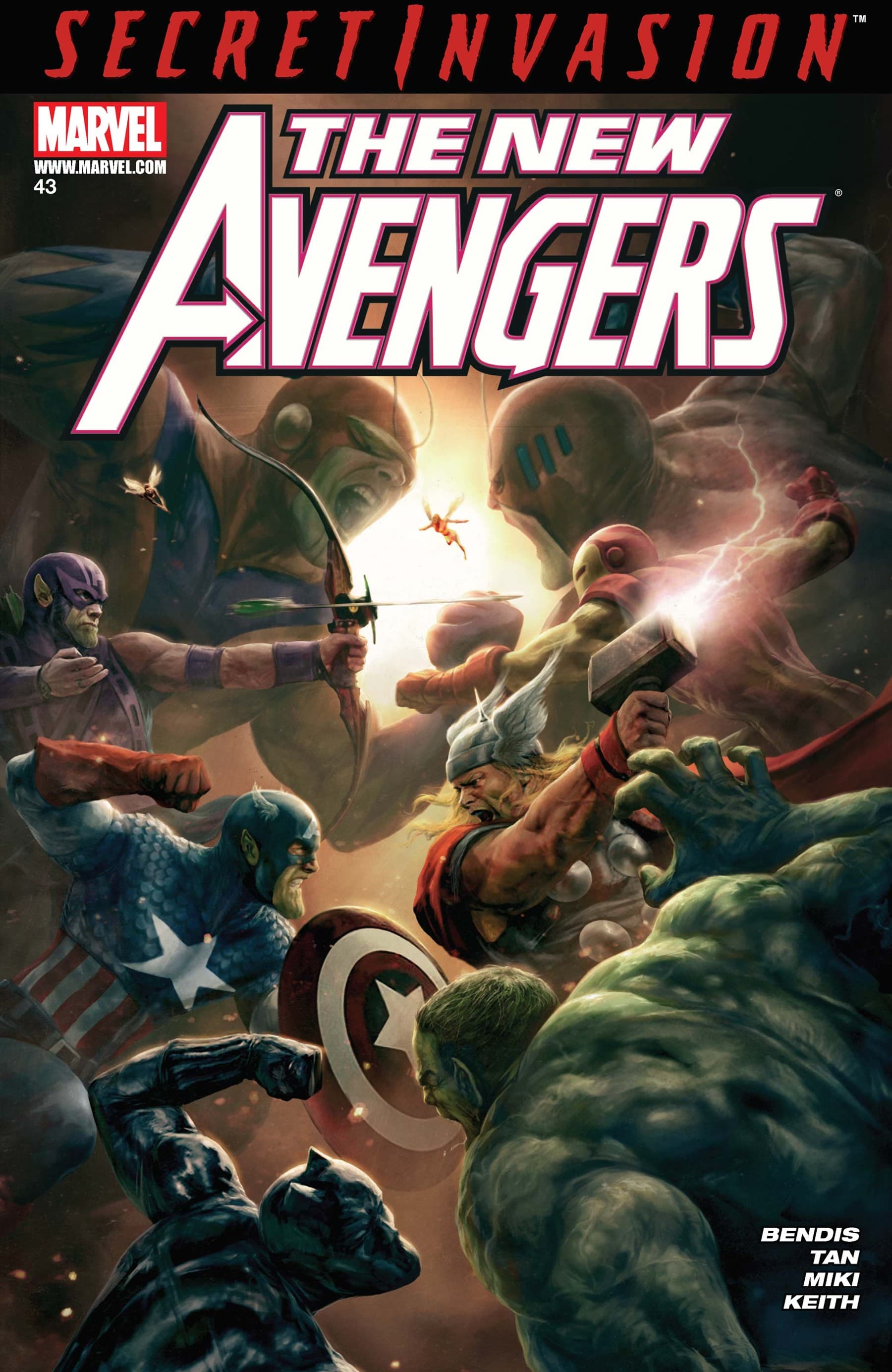
Brian Michael Bendis: I still, to this day, see people trying to get where [Leinil] got, and it's just wonderful. So I just wanted to give a shout out to the coauthors of this piece and how hard they worked, because, again, they were alone at their desk working really hard while I was high-fiving myself.
I can now reflect on my time at Marvel and go, "Oh, that was absolutely the group at its best." I was offered an opportunity to be at the head of the table with everyone, with people I admire, like Tom and Joe, and everyone's kicking ass and believing in everybody. I look back on all of it very fondly, and when I'm talking to creators that work there or want to, I'm like, "Yeah, the opportunity is humungous."
You're so alone, creating comics. Comics is a lonely art form, even if you're collaborating with your best friends. A lot of it is you're alone at your desk, right? So then opening to dozens, if not hundreds, of your peers and fellow craftsmen is a wonderful experience, and I'm really glad it happened.
Leinil Francis Yu: Looking at some of the pages, I can’t believe I got through them, almost on time. Of course, it’s nothing compared to George Perez and Bryan Hitch pages, but I’m happy with them… [I'm proud] that I finished an important Marvel comic that can be said in the same breath as CIVIL WAR, SECRET WARS, and INFINITY GAUNTLET.
Brian Michael Bendis: I will say what I'm really happy about is that it was created organically, honestly. It's a story we wanted to tell, not an "Oh, no! We need something for the summer!" It was like, "This is happening," and for them to say that was our best foot forward that summer and for all of the pieces and the audience to be in place for it was very exciting.
That part, I feel very good about, and it seems to be aging well, which is also great because while you're in the middle of an event, no matter what the event—and I've done a couple of them, and so have my friends, so we talk about it all the time. In the middle of the event, you feel—the internet is just so worried about you killing their favorite characters that they just don't let up on you. They just worry about it, and we do play into that sometimes. And again, this was an Internet from like 12-15 years ago, so it's kind of a different tone of Internet where you can have fun with someone getting worried about what's going to happen to Mockingbird.
We'd have fun, and so it was the perfect story for the time, and I'm glad it's aging well. When I look back on it, I think about that was us at our strongest editorially and as a team of freelancers and people working in the office. I really look back at that as a highlight of that. When people say warm things about it, I go, "Oh, good, because that was us doing it the right way." That's what I think.
Tom Brevoort (editor): It was easier to put together, to put to bed, than CIVIL WAR was. There were more delays and things on CIVIL WAR than on SECRET INVASION. It had a smoother time getting to the finish, maybe that was the surprising part: that it all kind of worked. But there wasn't a huge moment where, "Oh my God! This is actually doing well!" Walking in the door, my expectation was, "This is going to do well."
David Gabriel: SECRET INVASION had many things going for it. Great story, great art, great twists, great reception, and lots of excitement. [Since it was] one of the largest crossovers we had worked on since CIVIL WAR, we knew we had to throw out all the stops to generate the same type of CIVIL WAR-sized industry excitement.
Brian Michael Bendis: I also look at it as every event seemed to be, on some level, a reaction to the previous summer's event. So whereas CIVIL WAR, by just the nature of how it happened, you got a little ramshackle in the middle because there was some illness and some scheduling issues and we made the most of it, all of us did. I was a very good experience of adding to the stew as it went. But for this one, we thought the audience needs us to keep a tight ship and for these Skrulls to reveal and to really have an impact, it's got to really be planned.
This was a very tightly planned event and that, I'm very proud of. So was DARK REIGN, leading into SIEGE. When I think of SIEGE, you'll notice that SIEGE is literally half the size of SECRET INVASION. It's a tight four issues. It's the smallest of the events, and that's because we felt the audience was like, "Get to the good stuff" at the end. We took them for a ride, a thrill ride, but this is more of an action piece, and it shouldn't hold the same shape; it should be something else. So I like that we reacted to what we did for SECRET INVASION, we'll do differently for SIEGE. So that whole storyline feels very well editorially crafted by Tom Brevoort and the gang.
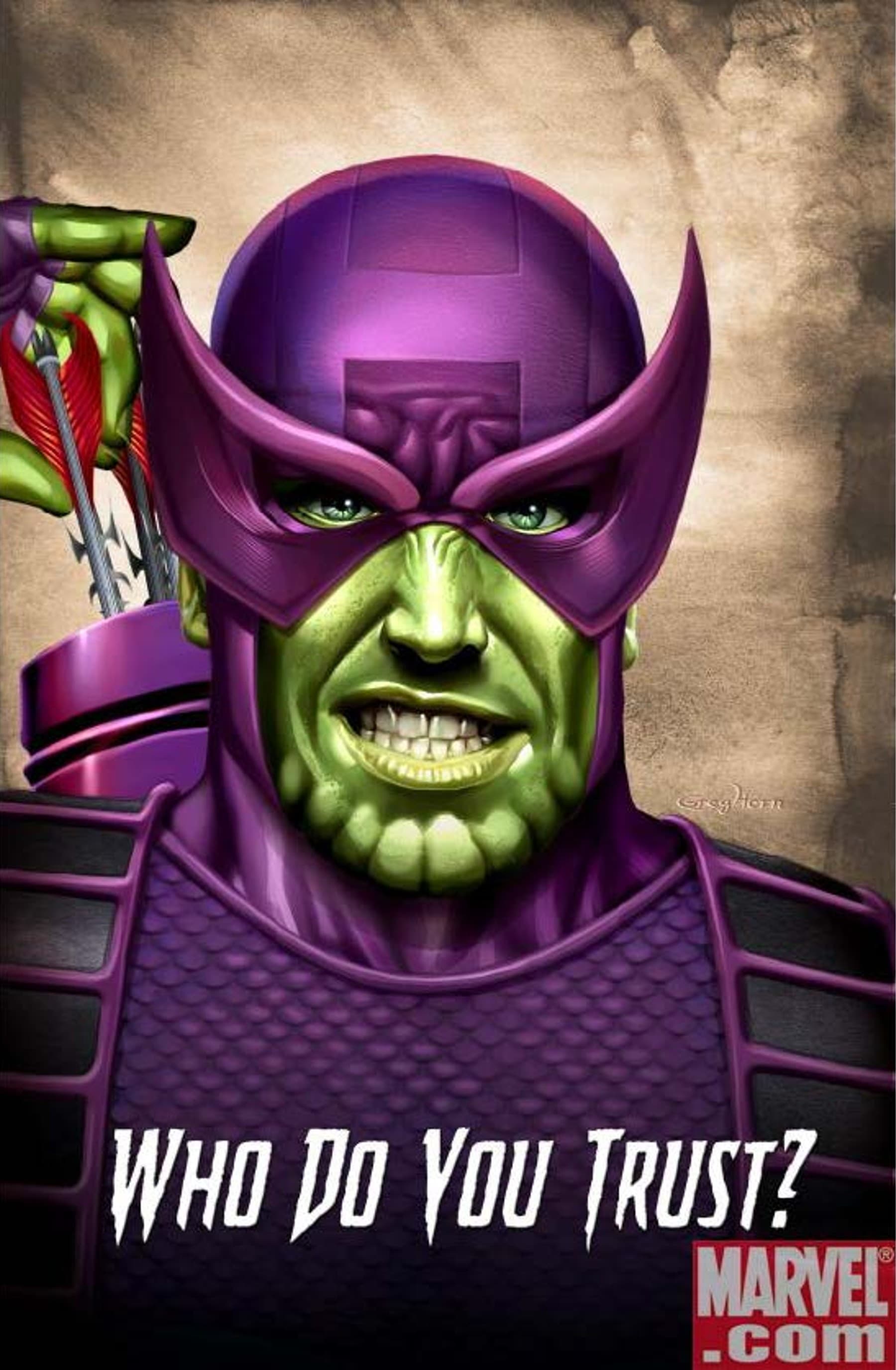
Aftermath and Impact
Tom Brevoort (editor): I'll say this, and this was something that we sort of half-figured out coming out of HOUSE OF M and CIVIL WAR, but it was really SECRET INVASION that drove it home, was the idea that one of the things that becomes the historical barometer of how good or bad an event is what its aftermath is and what its impact is on the line going forward.
SECRET INVASION had about as big an impact on the next two years of stories as any book that had come before it. Even CIVIL WAR, for all that it had some huge things at the end of it, probably didn't have as big or as all-reaching an impact as SECRET INVASION did. Consequently, SECRET INVASION—I think as people look back on it now—is a bigger structure maybe than WORLD WAR HULK or than some of the other things that were around it simply because it begat DARK REIGN.
So people that loved DARK REIGN or were into most of those comics or whatever, it all gets back-credited to SECRET INVASION, because that was the kickoff to DARK REIGN. It set this up and it put the Cabal in play; it made Norman the head of HAMMER, and now the heroes are all underdogs. That was a big part of what Brian's sell was going into DARK REIGN, and the end of SECRET INVASION was making all of the heroes Spider-Man.
Spider-Man is kind of the outlaw Super Hero who is not always understood or beloved by the cops or the public or the press or whatnot. Now we'll have a situation where pretty much all of the heroes are in those same shoes and have to face their version of whatever that situation is, and that was rich fodder for a lot of stories over a long period of time and probably the strongest period of Brian's run on AVENGERS.
You had a bunch of them over the course of that eight or nine years, but his DARK AVENGERS run and era, I think, was probably the boldest stuff that he did, the richest stuff that he did, especially given that it had no characters that anybody was really meant to care about for that long and in that way as headliners. I think the thing that we discovered was, if you're going to do a big event story as much as anything, it's going to be about what comes out of it and where that goes as it is the actual story itself.
Brian Michael Bendis (writer): What's great when you're in the middle of the event, some fans are hyper focused on every choice and really letting you have it and it's only afterwards with some perspective that the whole meal is consumed as you kind of wanted to. Also, with distance, people feel a little less worried about their favorite character dying because there's a beginning, middle, and end. It's been 15 years, and Spider-Man's still alive. I'm pretty sure he survives this. I can enjoy it.
So people do seem to enjoy the events on a different level with some distance, going back to the original SECRET WARS and CONTEST OF CHAMPIONS. It's delightful to survive the rollercoaster of emotions that is putting out a Super Hero thriller that goes on for eight-nine months and pretty much tortures some of the fans that are trying to guess everything.
Then afterwards, having turned all our cards over, people don't dismiss it, because that's the other thing: you've turned all your cards over and go, "Yeah, that sucks. No, thank you," but instead, we got a, "Well done." It's discussed in positive language, which is always nice. So that's what I see, and that's what I hope continues. I'm thrilled that it ages well. Again, that's something you try to do when you're doing it, but you don't know. It's impossible to wrap our heads around.
Tom Brevoort: One of the things that Brian and I talked about a lot after the fact is the fact that there's a profound difference in how people responded to this story after it was finished as opposed to when it was going on—which is to say, when it was going on, there was a lot of agita among the fan base. They weren't happy.
And by they, I don't mean every living person, but enough of them. Enough people did cause a thing. They were unhappy. They did not like this, and the reason they didn't like it really was they were uncertain of the ground that they were standing on. They were afraid we were going to do something bad and break the fundamentals of the Marvel Universe, kind of in the way I was arguing about at that retreat.
Once it was finished, they could draw a line and add up a total and go, "Here's what happened in it. I liked this. I don't like that. I like these outcomes. I don't like these outcomes. But net sum: positive. It's good." So at that point, new books would go up on Marvel Unlimited later.
So after SECRET INVASION finished, months later, suddenly there was all this positive response to it, and it's all the people who are now reading it online and who have it all in one spot and don't have to wait a month in between every chapter, just reading it and going, "I really like this rollercoaster ride, because I know now that the rollercoaster comes to a safe end at the end of the ride and then I get off and I get my cotton candy or whatever."
But, when it was coming out and when it was happening, boy, there were people that were not happy with it and were vocal about that fact. That's really just a byproduct of the fact that they didn't know what the outcome was going to be, and they figured the worst-case scenario is what it's definitely going to be.
Brian Michael Bendis: People did [go back to catch what they missed], by the way! That empowers you too, is that people immediately—sometimes the day of publication—post on my social media and/or message board (at the time), "Here is exactly everything that was said."
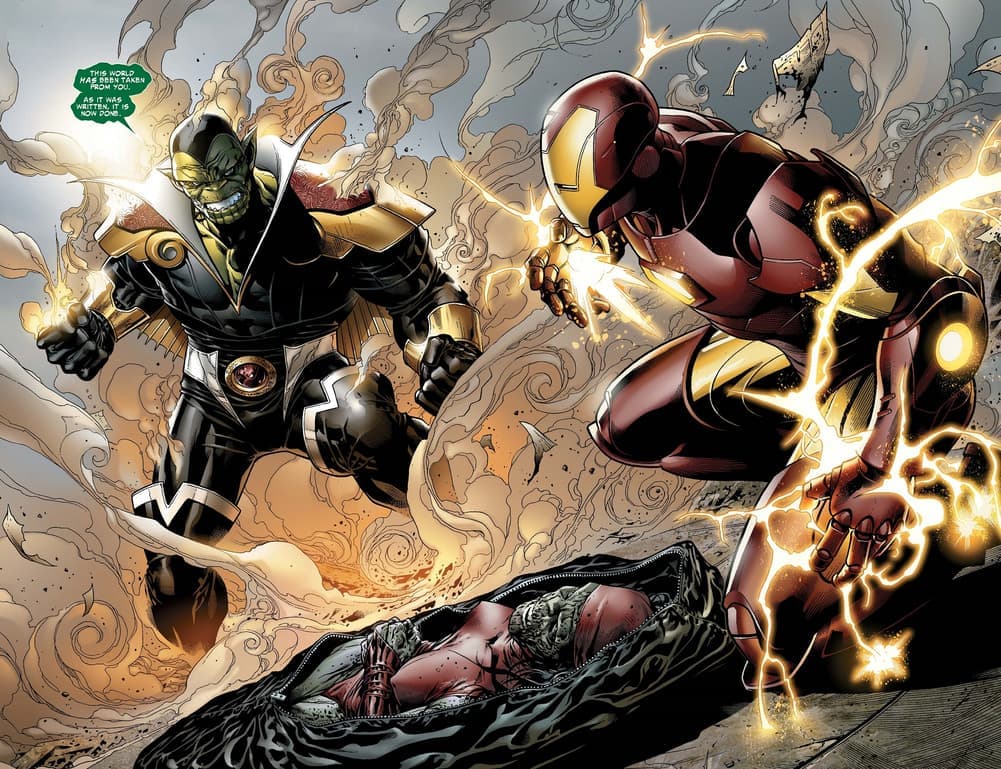
Legacy
Douglas Wolk (author, All of the Marvels: A Journey to the Ends of the Biggest Story Ever Told): There are echoes of SECRET INVASION's structure in most of Marvel's subsequent big crossovers, but I suspect its real legacy is how ingeniously uncomfortable its resolution is. Its desperate, displaced Skrulls, as devious as they are, aren't entirely unsympathetic, and seeing them taken down by the genuinely monstrous Norman Osborn—as a scheme to elevate himself and other monsters to power—makes the victory bitter.
Thunderbolts, where Osborn's new direction had developed over the previous couple of years, had spent a decade smudging the lines between heroism and villainy; with the end of SECRET INVASION and the beginning of the yearlong DARK REIGN sequence that followed it, that compelling moral tension spread outward to the rest of the Marvel universe, and it's stuck around ever since.
Dan Buckley (President, Marvel Comics): What am I proudest of? I gave a good enough environment for people to do cool stuff. I mean, that's kind of my job. I may say, "I'm never going to do that" or "Yeah, we'll do that, that's great," but I don't own these ideas. I'm someone who's just sitting in the room, making sure that the editors provide tighter guardrails. I provide the broad guardrails.
In that time period, we had a killer room. I'm not saying I don't have a killer room now, but Brian was on a roll, obviously, and he had been holding onto this idea, so just giving him the room to share it with everybody and then giving everyone the space to have it go broad, feel like they can execute it, feel like they're not going to be second guessed. It was highly integrated with a lot of different departments.
Sometimes, the editorial event stayed within publishing pretty tight, but this was very much shared with the digital group; it was shared with consumer products. There wasn't a big consumer products play on it, but the logo design was a little bit more sophisticated than everything but CIVIL WAR. It just had a different feel.
Ben Morse (former Marvel.com editor): I think that, to this day, it's one of the best marketed events. It's probably the reason you're doing this story on it, is the marketing of this was insane, like the Skrull masks and the slow reveal and just the story was amazing. Bendis did an incredible job. Everyone who worked on it did an incredible job.
Dan Buckley: I know we have a TV show, but part of the reason we have a TV show is because there's just something about the story and the way it was presented that it's just different. It was espionage and big Super Hero action at the same time, which is also hard to get. You could have a big Super Hero fights and you could have Nick Fury doing cool Nick Fury stuff at the same time.
You know, what I'm most proud of is the collaborative effort of it, how well it was executed, and the fact that we came out with such a great—we told a big story, but it wasn't the end of it. The DARK AVENGERS stuff and DARK REIGN really just—I mean, that, in some ways, was bigger than—from a comic book event, they probably sold more books around DARK REIGN, but it doesn't happen without doing such a good job around SECRET INVASION and allowing that to define a publishing plan for several years after that.
Because that means you've got a rich place for all your creators and your editors to play with. There's a lot of conflict with characters going on. They don't need to tell that story, but it's there for them to like, "Oh, I can put Daredevil in this situation because this weird situation with the Avengers and how New York City is being run, and with how the government acting, we can do this now." It's a great playground to play in. That was a fun playground.
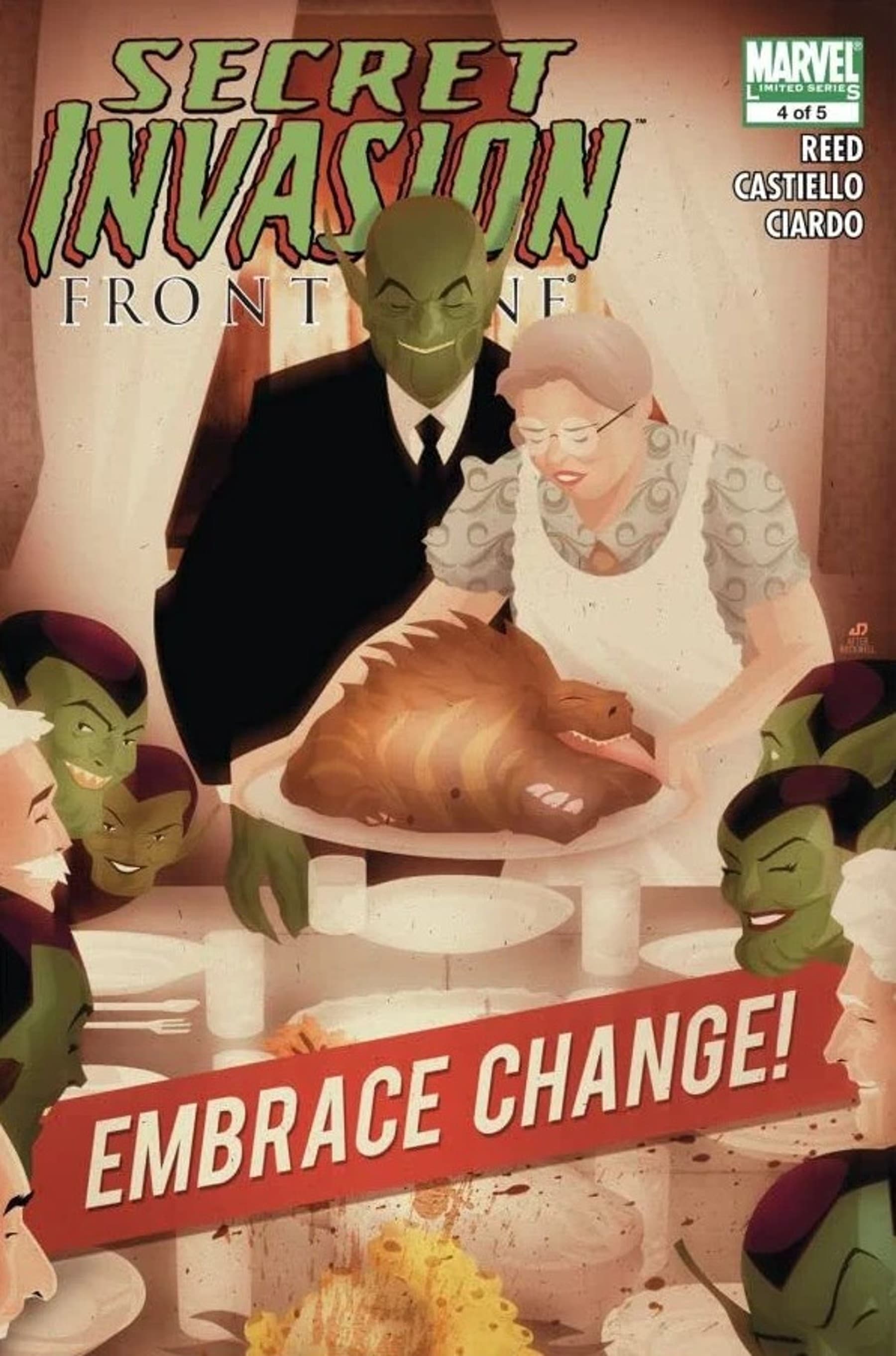
Ben Morse: I think that it was fortunate on my part that this was my first project at Marvel, because like I said, it would inform everything I would do afterwards. [It] would be like, "All right, well, this has potential if we go to this outlet," just basically involving the fans, involving the audience. I think that it started with CIVIL WAR, this idea that—well, look, I mean, if we're being realistic, it started back in the '60s with Stan Lee and Jack Kirby. They were always involving the readers and making them feel like they're part of the story.
I think SECRET INVASION opened the door for a lot of stuff like that because we could point to it and say, "Hey, here's something that we've done. Here's a proof of concept. Let us do something cool with your help."
Ryan Penagos (VP & Creative Executive, Marvel Brand & Franchise Management): I was proud to be a part of something that I loved. I loved the story, so supporting it, getting it in front of people, seeing people enjoy the comic, wear the masks, use the screensavers, and then posting things about it was great. It was encouraging. It was like seeing tangible proof that what you're doing is getting consumed and enjoyed by people. That's great.
But I also got to convince them to let me write a four-page Skrull SECRET INVASION coda story in Marvel Unlimited, or Marvel Digital Comics. I got to write a sad Christmas Skrull story named after a Wham! song that was drawn by my friend Juan Doe, so I have this little tie to SECRET INVASION's story. That is the most fun thing for me, because I loved it. I really did.
I reread SECRET INVASION again last year and I was like, "This still holds up. It's a lot of fun. It's action packed and there's so many mysteries and cool things." We could have done this for a year and still had a lot of extra content. Yeah, I think it was just a successful story—that wonderful part where it is successful, but it is also really well done.
So sometimes not everything is great, but it sells well. Sometimes things sell well, or don't sell well, and they're great. This was everything. To see how maybe we helped inform a couple of people about it who didn't know or get them to buy in by us promoting it was great.
All the other stuff that they were doing and all the extra stories that Brian was building and the different things. You could tell the creators were just like, "Oh man, this is fun. I want in!" Everybody wanted in on it, which was cool.
Brian Michael Bendis (writer): And then I must say, I was planning some of these things specifically to counter what I knew the MCU was going to be. I was working on Iron Man 2, I think, when I was doing this. To think that Avengers, even the movie Avengers was on its way, let alone a high-end Secret Invasion thriller TV show! Disney+ streaming didn't exist! Nothing existed that has created the environment that creates the Secret Invasion TV show.
I couldn't in a million years fathom that that would be out there for all of us to enjoy based on this work. I'm thrilled. I'm so farther thrilled than I thought it would be while I was doing it that I can't even discuss it at this point. It's so beyond—I'm trying to describe to people we're just trying to tell the biggest, coolest event and hope it doesn't suck and hope when they rank top ten Marvel events, it's not #30 and doing the best we can and trying to give you something we don't think you can get anywhere else. And then, low and behold, 15 years later, here's the world we live in and it's part of this environment. It's fantastic. It's way more than I ever thought it could be. I can't even hope for more than what I have.
WRITTEN BY MEAGAN DAMORE | July 14, 2023
These interviews have been edited and condensed for clarity.
Related
Comics
The Fantastic Four's Most Creative Plans to Save the DayFrom turning Skrulls into cows to teleporting the Baxter Building into the future, learn about some of the Fantastic Four’s most out-of-the-box solutions.
Comics
NYCC 2025: 'Godzilla: Infinity Roar' Marks Marvel Comics' Next Crossover Epic with Toho InternationalAnnounced at New York Comic Con 2025, the King of the Monsters takes on the Marvel Cosmos in 'Godzilla: Infinity Roar,' a five-issue series by Gerry Duggan, Javier Garrón, and Ig Guara.
Comics
The Inhumans Return and Stake a Claim for the Galactic Throne in ‘Imperial’ #4 and BeyondGet a first look inside ‘Imperial’ #4 and the new cosmic order it ushers in, including a preview of ‘Nova: Centurion’ #1.
Comics
Ten Things Reed Richards Feels Guilty AboutLearn about Mister Fantastic’s biggest regrets and worst mistakes in both his personal life and super hero career.
